A cybercrook who has been setting up websites that mimic the self-destructing message service privnote.com accidentally exposed the breadth of their operations recently when they threatened to sue a software company. The disclosure revealed a profitable network of phishing sites that behave and look like the real Privnote, except that any messages containing cryptocurrency addresses will be automatically altered to include a different payment address controlled by the scammers.
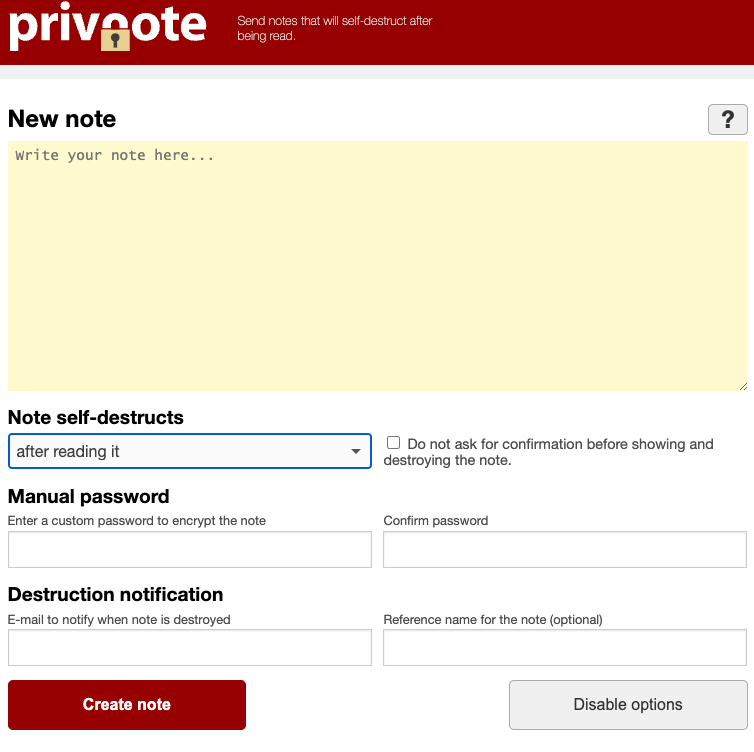
The real Privnote, at privnote.com.
Launched in 2008, privnote.com employs technology that encrypts each message so that even Privnote itself cannot read its contents. And it doesn’t send or receive messages. Creating a message merely generates a link. When that link is clicked or visited, the service warns that the message will be gone forever after it is read.
Privnote’s ease-of-use and popularity among cryptocurrency enthusiasts has made it a perennial target of phishers, who erect Privnote clones that function more or less as advertised but also quietly inject their own cryptocurrency payment addresses when a note is created that contains crypto wallets.
Last month, a new user on GitHub named fory66399 lodged a complaint on the “issues” page for MetaMask, a software cryptocurrency wallet used to interact with the Ethereum blockchain. Fory66399 insisted that their website — privnote[.]co — was being wrongly flagged by MetaMask’s “eth-phishing-detect” list as malicious.
“We filed a lawsuit with a lawyer for dishonestly adding a site to the block list, damaging reputation, as well as ignoring the moderation department and ignoring answers!” fory66399 threatened. “Provide evidence or I will demand compensation!”
MetaMask’s lead product manager Taylor Monahan replied by posting several screenshots of privnote[.]co showing the site did indeed swap out any cryptocurrency addresses.
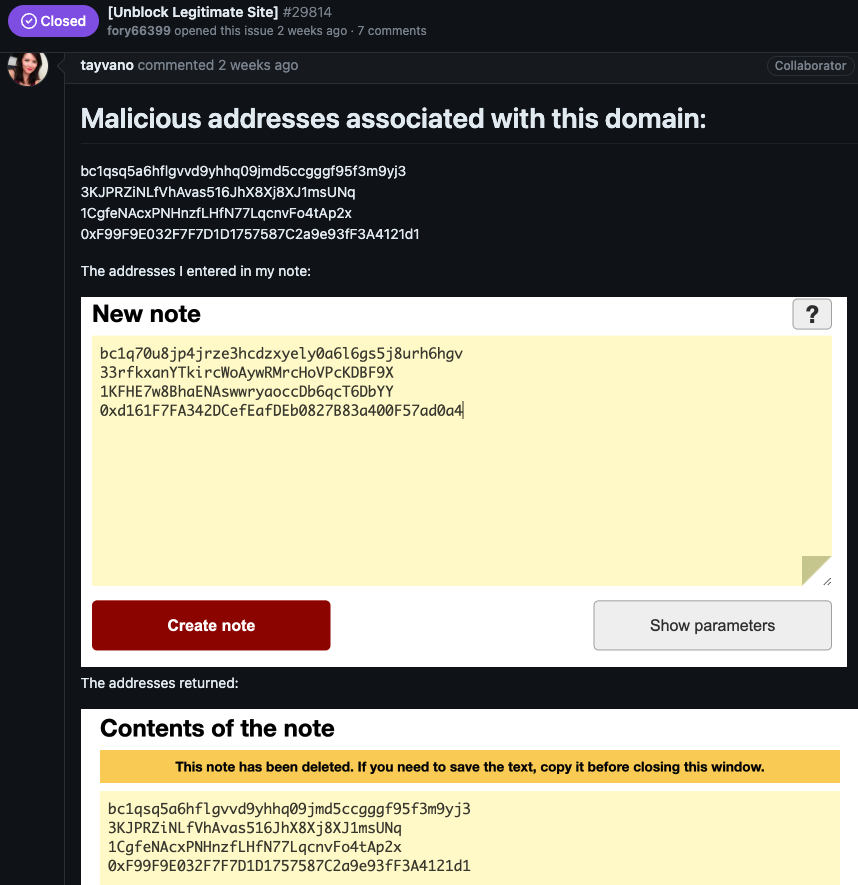
After being told where they could send a copy of their lawsuit, Fory66399 appeared to become flustered, and proceeded to mention a number of other interesting domain names:
You sent me screenshots from some other site! It’s red!!!!
The tornote.io website has a different color altogether
The privatenote,io website also has a different color! What’s wrong?????
A search at DomainTools.com for privatenote[.]io shows it has been registered to two names over as many years, including Andrey Sokol from Moscow and Alexandr Ermakov from Kiev. There is no indication these are the real names of the phishers, but the names are useful in pointing to other sites targeting Privnote since 2020.
DomainTools says other domains registered to Alexandr Ermakov include pirvnota[.]com, privatemessage[.]net, privatenote[.]io, and tornote[.]io.
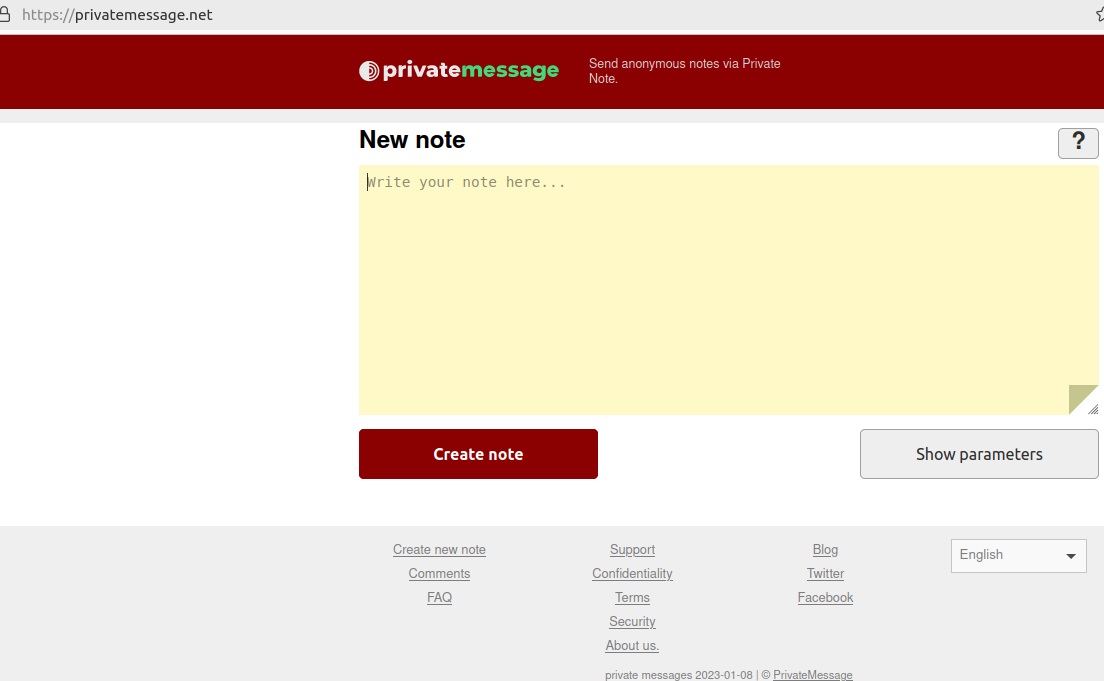
A screenshot of the phishing domain privatemessage dot net.
The registration records for pirvnota[.]com at one point were updated from Andrey Sokol to “BPW” as the registrant organization, and “Tambov district” in the registrant state/province field. Searching DomainTools for domains that include both of these terms reveals pirwnote[.]com.
Other Privnote phishing domains that also phoned home to the same Internet address as pirwnote[.]com include privnode[.]com, privnate[.]com, and prevnóte[.]com. Pirwnote[.]com is currently selling security cameras made by the Chinese manufacturer Hikvision, via an Internet address based in Hong Kong.
It appears someone has gone to great lengths to make tornote[.]io seem like a legitimate website. For example, this account at Medium has authored more than a dozen blog posts in the past year singing the praises of Tornote as a secure, self-destructing messaging service. However, testing shows tornote[.]io will also replace any cryptocurrency addresses in messages with their own payment address.
These malicious note sites attract visitors by gaming search engine results to make the phishing domains appear prominently in search results for “privnote.” A search in Google for “privnote” currently returns tornote[.]io as the fifth result. Like other phishing sites tied to this network, Tornote will use the same cryptocurrency addresses for roughly 5 days, and then rotate in new payment addresses.
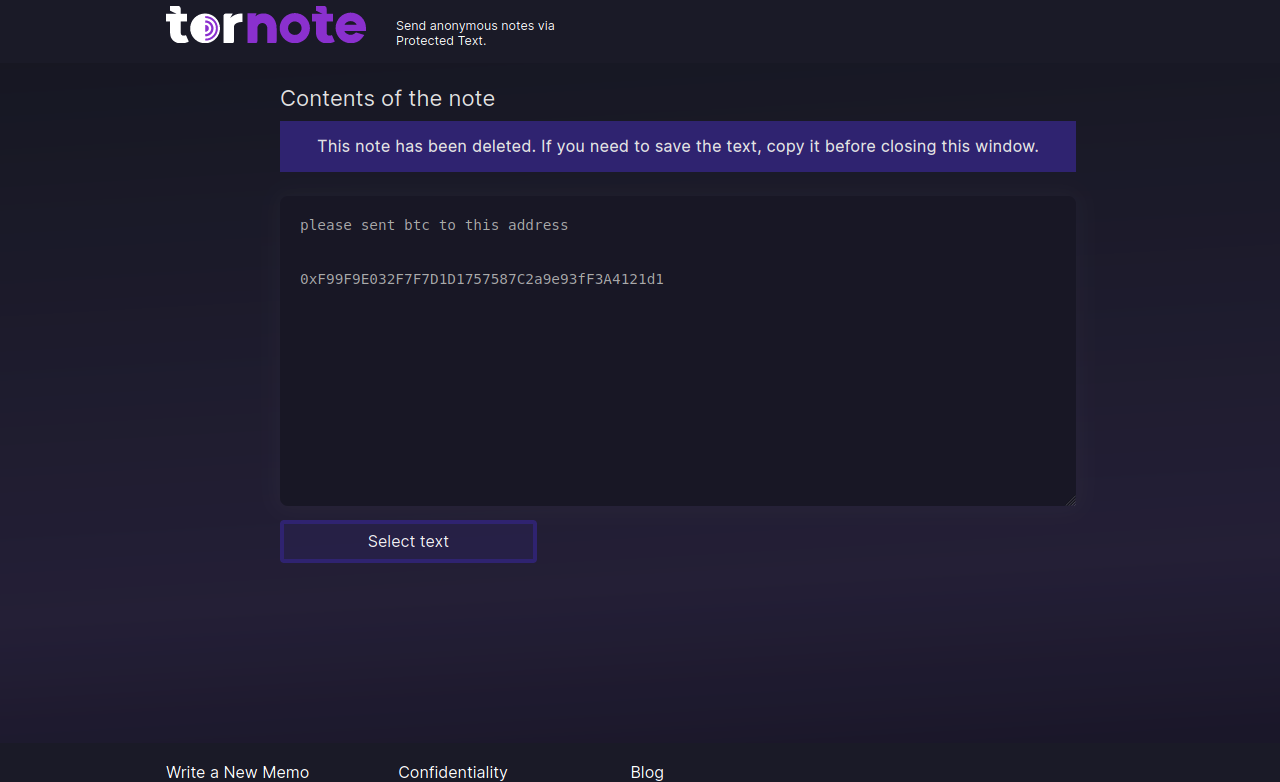
Tornote changed the cryptocurrency address entered into a test note to this address controlled by the phishers.
Throughout 2023, Tornote was hosted with the Russian provider DDoS-Guard, at the Internet address 186.2.163[.]216. A review of the passive DNS records tied to this address shows that apart from subdomains dedicated to tornote[.]io, the main other domain at this address was hkleaks[.]ml.
In August 2019, a slew of websites and social media channels dubbed “HKLEAKS” began doxing the identities and personal information of pro-democracy activists in Hong Kong. According to a report (PDF) from Citizen Lab, hkleaks[.]ml was the second domain that appeared as the perpetrators began to expand the list of those doxed.

HKleaks, as indexed by The Wayback Machine.
DomainTools shows there are more than 1,000 other domains whose registration records include the organization name “BPW” and “Tambov District” as the location. Virtually all of those domains were registered through one of two registrars — Hong Kong-based Nicenic and Singapore-based WebCC — and almost all appear to be phishing or pill-spam related.
Among those is rustraitor[.]info, a website erected after Russia invaded Ukraine in early 2022 that doxed Russians perceived to have helped the Ukrainian cause.

An archive.org copy of Rustraitor.
In keeping with the overall theme, these phishing domains appear focused on stealing usernames and passwords to some of the cybercrime underground’s busiest shops, including Brian’s Club. What do all the phished sites have in common? They all accept payment via virtual currencies.
It appears MetaMask’s Monahan made the correct decision in forcing these phishers to tip their hand: Among the websites at that DDoS-Guard address are multiple MetaMask phishing domains, including metarrnask[.]com, meternask[.]com, and rnetamask[.]com.
How profitable are these private note phishing sites? Reviewing the four malicious cryptocurrency payment addresses that the attackers swapped into notes passed through privnote[.]co (as pictured in Monahan’s screenshot above) shows that between March 15 and March 19, 2024, those address raked in and transferred out nearly $18,000 in cryptocurrencies. And that’s just one of their phishing websites.
Roughly nine years ago, KrebsOnSecurity profiled a Pakistan-based cybercrime group called “The Manipulaters,” a sprawling web hosting network of phishing and spam delivery platforms. In January 2024, The Manipulaters pleaded with this author to unpublish previous stories about their work, claiming the group had turned over a new leaf and gone legitimate. But new research suggests that while they have improved the quality of their products and services, these nitwits still fail spectacularly at hiding their illegal activities.
In May 2015, KrebsOnSecurity published a brief writeup about the brazen Manipulaters team, noting that they openly operated hundreds of web sites selling tools designed to trick people into giving up usernames and passwords, or deploying malicious software on their PCs.
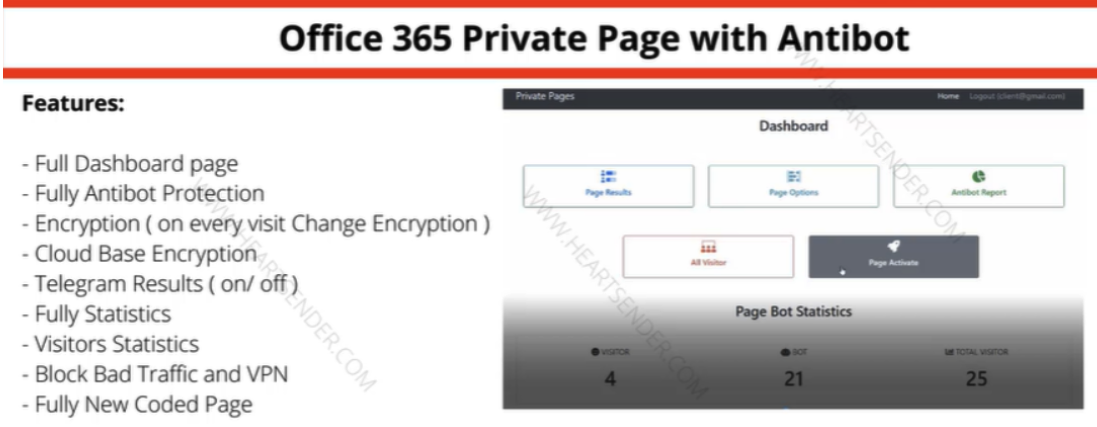
Manipulaters advertisement for “Office 365 Private Page with Antibot” phishing kit sold on the domain heartsender,com. “Antibot” refers to functionality that attempts to evade automated detection techniques, keeping a phish deployed as long as possible. Image: DomainTools.
The core brand of The Manipulaters has long been a shared cybercriminal identity named “Saim Raza,” who for the past decade has peddled a popular spamming and phishing service variously called “Fudtools,” “Fudpage,” “Fudsender,” “FudCo,” etc. The term “FUD” in those names stands for “Fully Un-Detectable,” and it refers to cybercrime resources that will evade detection by security tools like antivirus software or anti-spam appliances.
A September 2021 story here checked in on The Manipulaters, and found that Saim Raza and company were prospering under their FudCo brands, which they secretly managed from a front company called We Code Solutions.
That piece worked backwards from all of the known Saim Raza email addresses to identify Facebook profiles for multiple We Code Solutions employees, many of whom could be seen celebrating company anniversaries gathered around a giant cake with the words “FudCo” painted in icing.

Since that story ran, KrebsOnSecurity has heard from this Saim Raza identity on two occasions. The first was in the weeks following the Sept. 2021 piece, when one of Saim Raza’s known email addresses — bluebtcus@gmail.com — pleaded to have the story taken down.
“Hello, we already leave that fud etc before year,” the Saim Raza identity wrote. “Why you post us? Why you destroy our lifes? We never harm anyone. Please remove it.”
Not wishing to be manipulated by a phishing gang, KrebsOnSecurity ignored those entreaties. But on Jan. 14, 2024, KrebsOnSecurity heard from the same bluebtcus@gmail.com address, apropos of nothing.
“Please remove this article,” Sam Raza wrote, linking to the 2021 profile. “Please already my police register case on me. I already leave everything.”
Asked to elaborate on the police investigation, Saim Raza said they were freshly released from jail.
“I was there many days,” the reply explained. “Now back after bail. Now I want to start my new work.”
Exactly what that “new work” might entail, Saim Raza wouldn’t say. But a new report from researchers at DomainTools.com finds that several computers associated with The Manipulaters have been massively hacked by malicious data- and password-snarfing malware for quite some time.
DomainTools says the malware infections on Manipulaters PCs exposed “vast swaths of account-related data along with an outline of the group’s membership, operations, and position in the broader underground economy.”
“Curiously, the large subset of identified Manipulaters customers appear to be compromised by the same stealer malware,” DomainTools wrote. “All observed customer malware infections began after the initial compromise of Manipulaters PCs, which raises a number of questions regarding the origin of those infections.”
A number of questions, indeed. The core Manipulaters product these days is a spam delivery service called HeartSender, whose homepage openly advertises phishing kits targeting users of various Internet companies, including Microsoft 365, Yahoo, AOL, Intuit, iCloud and ID.me, to name a few.
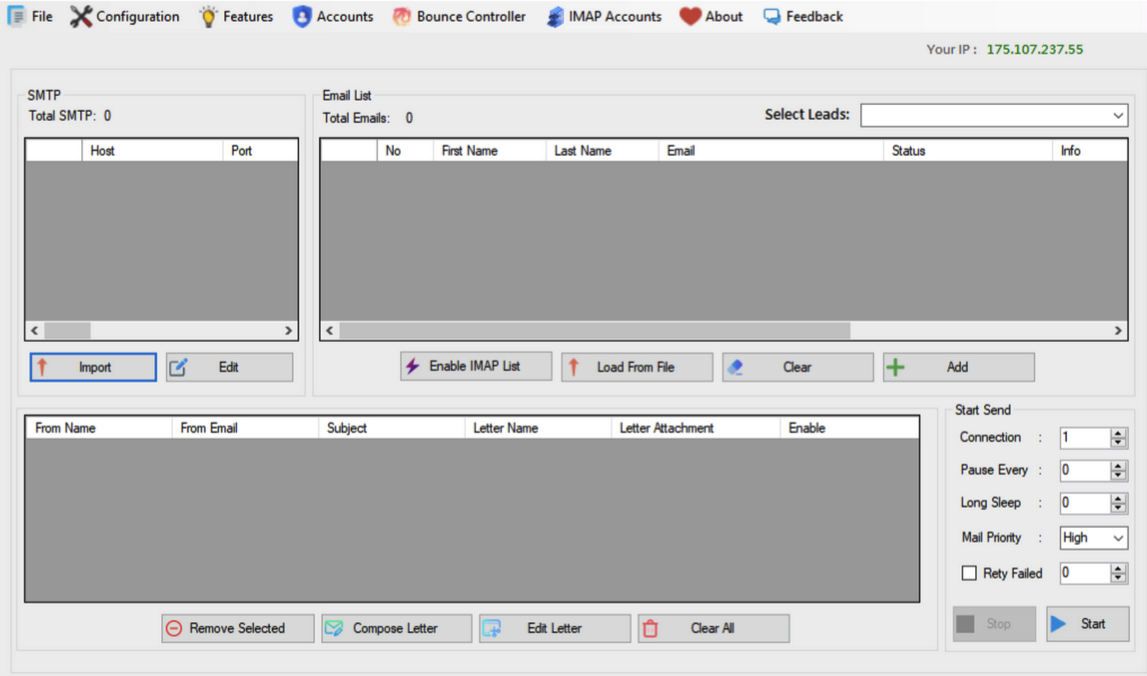
A screenshot of the homepage of HeartSender 4 displays an IP address tied to fudtoolshop@gmail.com. Image: DomainTools.
HeartSender customers can interact with the subscription service via the website, but the product appears to be far more effective and user-friendly if one downloads HeartSender as a Windows executable program. Whether that HeartSender program was somehow compromised and used to infect the service’s customers is unknown.
However, DomainTools also found the hosted version of HeartSender service leaks an extraordinary amount of user information that probably is not intended to be publicly accessible. Apparently, the HeartSender web interface has several webpages that are accessible to unauthenticated users, exposing customer credentials along with support requests to HeartSender developers.
“Ironically, the Manipulaters may create more short-term risk to their own customers than law enforcement,” DomainTools wrote. “The data table “User Feedbacks” (sic) exposes what appear to be customer authentication tokens, user identifiers, and even a customer support request that exposes root-level SMTP credentials–all visible by an unauthenticated user on a Manipulaters-controlled domain. Given the risk for abuse, this domain will not be published.”
This is hardly the first time The Manipulaters have shot themselves in the foot. In 2019, The Manipulaters failed to renew their core domain name — manipulaters[.]com — the same one tied to so many of the company’s past and current business operations. That domain was quickly scooped up by Scylla Intel, a cyber intelligence firm that focuses on connecting cybercriminals to their real-life identities.
Currently, The Manipulaters seem focused on building out and supporting HeartSender, which specializes in spam and email-to-SMS spamming services.
“The Manipulaters’ newfound interest in email-to-SMS spam could be in response to the massive increase in smishing activity impersonating the USPS,” DomainTools wrote. “Proofs posted on HeartSender’s Telegram channel contain numerous references to postal service impersonation, including proving delivery of USPS-themed phishing lures and the sale of a USPS phishing kit.”
Reached via email, the Saim Raza identity declined to respond to questions about the DomainTools findings.
“First [of] all we never work on virus or compromised computer etc,” Raza replied. “If you want to write like that fake go ahead. Second I leave country already. If someone bind anything with exe file and spread on internet its not my fault.”
Asked why they left Pakistan, Saim Raza said the authorities there just wanted to shake them down.
“After your article our police put FIR on my [identity],” Saim Raza explained. “FIR” in this case stands for “First Information Report,” which is the initial complaint in the criminal justice system of Pakistan.
“They only get money from me nothing else,” Saim Raza continued. “Now some officers ask for money again again. Brother, there is no good law in Pakistan just they need money.”
Saim Raza has a history of being slippery with the truth, so who knows whether The Manipulaters and/or its leaders have in fact fled Pakistan (it may be more of an extended vacation abroad). With any luck, these guys will soon venture into a more Western-friendly, “good law” nation and receive a warm welcome by the local authorities.
Thread hijacking attacks. They happen when someone you know has their email account compromised, and you are suddenly dropped into an existing conversation between the sender and someone else. These missives draw on the recipient’s natural curiosity about being copied on a private discussion, which is modified to include a malicious link or attachment. Here’s the story of a thread hijacking attack in which a journalist was copied on a phishing email from the unwilling subject of a recent scoop.
In Sept. 2023, the Pennsylvania news outlet LancasterOnline.com published a story about Adam Kidan, a wealthy businessman with a criminal past who is a major donor to Republican causes and candidates, including Rep. Lloyd Smucker (R-Pa).
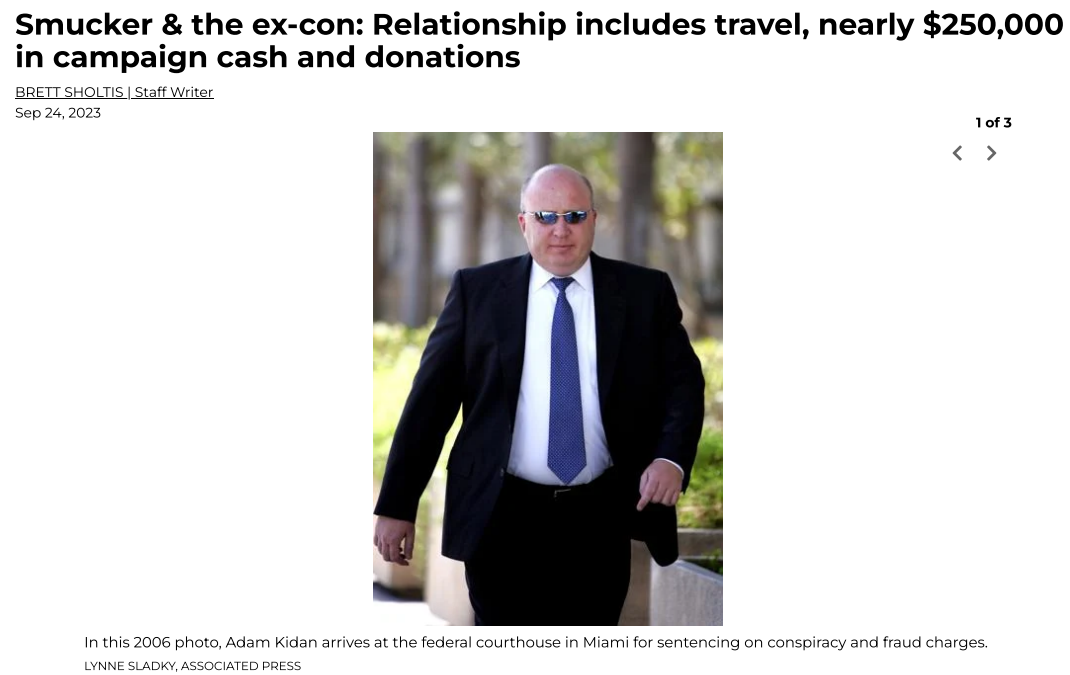
The LancasterOnline story about Adam Kidan.
Several months after that piece ran, the story’s author Brett Sholtis received two emails from Kidan, both of which contained attachments. One of the messages appeared to be a lengthy conversation between Kidan and a colleague, with the subject line, “Re: Successfully sent data.” The second missive was a more brief email from Kidan with the subject, “Acknowledge New Work Order,” and a message that read simply, “Please find the attached.”
Sholtis said he clicked the attachment in one of the messages, which then launched a web page that looked exactly like a Microsoft Office 365 login page. An analysis of the webpage reveals it would check any submitted credentials at the real Microsoft website, and return an error if the user entered bogus account information. A successful login would record the submitted credentials and forward the victim to the real Microsoft website.
But Sholtis said he didn’t enter his Outlook username and password. Instead, he forwarded the messages to LancasterOneline’s IT team, which quickly flagged them as phishing attempts.
LancasterOnline Executive Editor Tom Murse said the two phishing messages from Mr. Kidan raised eyebrows in the newsroom because Kidan had threatened to sue the news outlet multiple times over Sholtis’s story.
“We were just perplexed,” Murse said. “It seemed to be a phishing attempt but we were confused why it would come from a prominent businessman we’ve written about. Our initial response was confusion, but we didn’t know what else to do with it other than to send it to the FBI.”
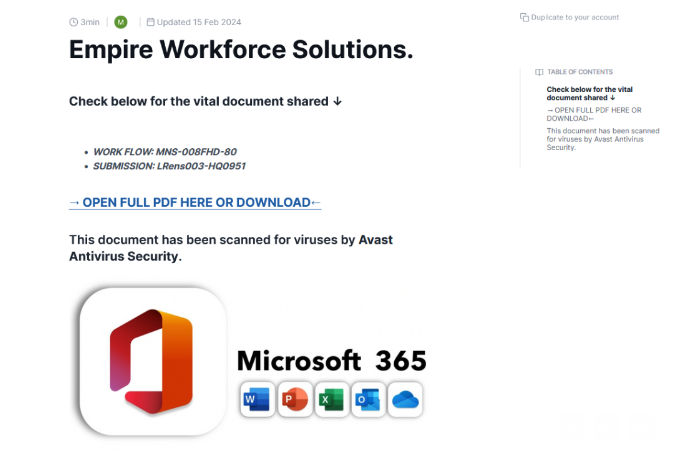
The phishing lure attached to the thread hijacking email from Mr. Kidan.
In 2006, Kidan was sentenced to 70 months in federal prison after pleading guilty to defrauding lenders along with Jack Abramoff, the disgraced lobbyist whose corruption became a symbol of the excesses of Washington influence peddling. He was paroled in 2009, and in 2014 moved his family to a home in Lancaster County, Pa.
The FBI hasn’t responded to LancasterOnline’s tip. Messages sent by KrebsOnSecurity to Kidan’s emails addresses were returned as blocked. Messages left with Mr. Kidan’s company, Empire Workforce Solutions, went unreturned.
No doubt the FBI saw the messages from Kidan for what they likely were: The result of Mr. Kidan having his Microsoft Outlook account compromised and used to send malicious email to people in his contacts list.
Thread hijacking attacks are hardly new, but that is mainly true because many Internet users still don’t know how to identify them. The email security firm Proofpoint says it has tracked north of 90 million malicious messages in the last five years that leverage this attack method.
One key reason thread hijacking is so successful is that these attacks generally do not include the tell that exposes most phishing scams: A fabricated sense of urgency. A majority of phishing threats warn of negative consequences should you fail to act quickly — such as an account suspension or an unauthorized high-dollar charge going through.
In contrast, thread hijacking campaigns tend to patiently prey on the natural curiosity of the recipient.
Ryan Kalember, chief strategy officer at Proofpoint, said probably the most ubiquitous examples of thread hijacking are “CEO fraud” or “business email compromise” scams, wherein employees are tricked by an email from a senior executive into wiring millions of dollars to fraudsters overseas.
But Kalember said these low-tech attacks can nevertheless be quite effective because they tend to catch people off-guard.
“It works because you feel like you’re suddenly included in an important conversation,” Kalember said. “It just registers a lot differently when people start reading, because you think you’re observing a private conversation between two different people.”
Some thread hijacking attacks actually involve multiple threat actors who are actively conversing while copying — but not addressing — the recipient.
“We call these multi-persona phishing scams, and they’re often paired with thread hijacking,” Kalember said. “It’s basically a way to build a little more affinity than just copying people on an email. And the longer the conversation goes on, the higher their success rate seems to be because some people start replying to the thread [and participating] psycho-socially.”
The best advice to sidestep phishing scams is to avoid clicking on links or attachments that arrive unbidden in emails, text messages and other mediums. If you’re unsure whether the message is legitimate, take a deep breath and visit the site or service in question manually — ideally, using a browser bookmark so as to avoid potential typosquatting sites.
For years, analysts, security specialists, and security architects alike have been encouraging organizations to become DMARC compliant. This involves deploying email authentication to ensure their… Read more on Cisco Blogs

The nonprofit organization that supports the Firefox web browser said today it is winding down its new partnership with Onerep, an identity protection service recently bundled with Firefox that offers to remove users from hundreds of people-search sites. The move comes just days after a report by KrebsOnSecurity forced Onerep’s CEO to admit that he has founded dozens of people-search networks over the years.
Mozilla only began bundling Onerep in Firefox last month, when it announced the reputation service would be offered on a subscription basis as part of Mozilla Monitor Plus. Launched in 2018 under the name Firefox Monitor, Mozilla Monitor also checks data from the website Have I Been Pwned? to let users know when their email addresses or password are leaked in data breaches.
On March 14, KrebsOnSecurity published a story showing that Onerep’s Belarusian CEO and founder Dimitiri Shelest launched dozens of people-search services since 2010, including a still-active data broker called Nuwber that sells background reports on people. Onerep and Shelest did not respond to requests for comment on that story.
But on March 21, Shelest released a lengthy statement wherein he admitted to maintaining an ownership stake in Nuwber, a consumer data broker he founded in 2015 — around the same time he launched Onerep.
Shelest maintained that Nuwber has “zero cross-over or information-sharing with Onerep,” and said any other old domains that may be found and associated with his name are no longer being operated by him.
“I get it,” Shelest wrote. “My affiliation with a people search business may look odd from the outside. In truth, if I hadn’t taken that initial path with a deep dive into how people search sites work, Onerep wouldn’t have the best tech and team in the space. Still, I now appreciate that we did not make this more clear in the past and I’m aiming to do better in the future.” The full statement is available here (PDF).
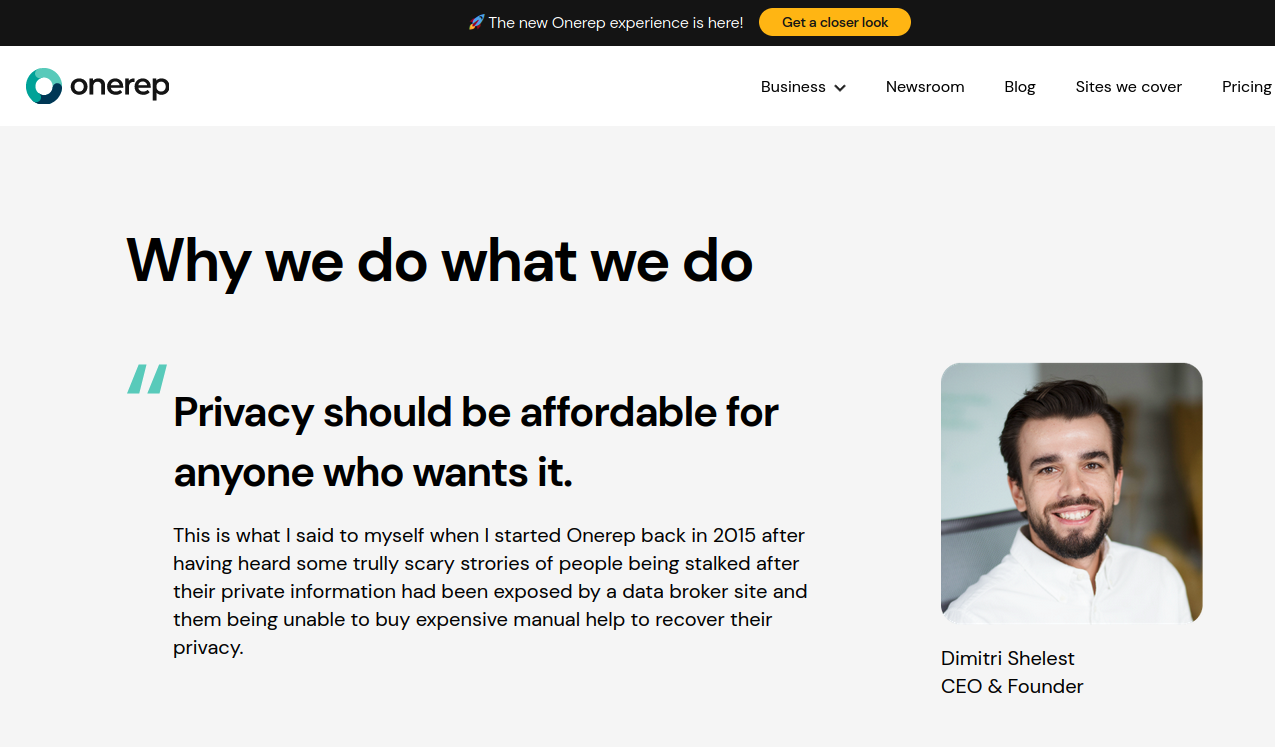
Onerep CEO and founder Dimitri Shelest.
In a statement released today, a spokesperson for Mozilla said it was moving away from Onerep as a service provider in its Monitor Plus product.
“Though customer data was never at risk, the outside financial interests and activities of Onerep’s CEO do not align with our values,” Mozilla wrote. “We’re working now to solidify a transition plan that will provide customers with a seamless experience and will continue to put their interests first.”
KrebsOnSecurity also reported that Shelest’s email address was used circa 2010 by an affiliate of Spamit, a Russian-language organization that paid people to aggressively promote websites hawking male enhancement drugs and generic pharmaceuticals. As noted in the March 14 story, this connection was confirmed by research from multiple graduate students at my alma mater George Mason University.
Shelest denied ever being associated with Spamit. “Between 2010 and 2014, we put up some web pages and optimize them — a widely used SEO practice — and then ran AdSense banners on them,” Shelest said, presumably referring to the dozens of people-search domains KrebsOnSecurity found were connected to his email addresses (dmitrcox@gmail.com and dmitrcox2@gmail.com). “As we progressed and learned more, we saw that a lot of the inquiries coming in were for people.”
Shelest also acknowledged that Onerep pays to run ads on “on a handful of data broker sites in very specific circumstances.”
“Our ad is served once someone has manually completed an opt-out form on their own,” Shelest wrote. “The goal is to let them know that if they were exposed on that site, there may be others, and bring awareness to there being a more automated opt-out option, such as Onerep.”
Reached via Twitter/X, HaveIBeenPwned founder Troy Hunt said he knew Mozilla was considering a partnership with Onerep, but that he was previously unaware of the Onerep CEO’s many conflicts of interest.
“I knew Mozilla had this in the works and we’d casually discussed it when talking about Firefox monitor,” Hunt told KrebsOnSecurity. “The point I made to them was the same as I’ve made to various companies wanting to put data broker removal ads on HIBP: removing your data from legally operating services has minimal impact, and you can’t remove it from the outright illegal ones who are doing the genuine damage.”
Playing both sides — creating and spreading the same digital disease that your medicine is designed to treat — may be highly unethical and wrong. But in the United States it’s not against the law. Nor is collecting and selling data on Americans. Privacy experts say the problem is that data brokers, people-search services like Nuwber and Onerep, and online reputation management firms exist because virtually all U.S. states exempt so-called “public” or “government” records from consumer privacy laws.
Those include voting registries, property filings, marriage certificates, motor vehicle records, criminal records, court documents, death records, professional licenses, and bankruptcy filings. Data brokers also can enrich consumer records with additional information, by adding social media data and known associates.
The March 14 story on Onerep was the second in a series of three investigative reports published here this month that examined the data broker and people-search industries, and highlighted the need for more congressional oversight — if not regulation — on consumer data protection and privacy.
On March 8, KrebsOnSecurity published A Close Up Look at the Consumer Data Broker Radaris, which showed that the co-founders of Radaris operate multiple Russian-language dating services and affiliate programs. It also appears many of their businesses have ties to a California marketing firm that works with a Russian state-run media conglomerate currently sanctioned by the U.S. government.
On March 20, KrebsOnSecurity published The Not-So-True People-Search Network from China, which revealed an elaborate web of phony people-search companies and executives designed to conceal the location of people-search affiliates in China who are earning money promoting U.S. based data brokers that sell personal information on Americans.
Security Operations is the beating heart of any organization, a united team vigilantly standing guard against cyber threats. To outsmart their adversaries, they must delve deep into the intricate… Read more on Cisco Blogs
It’s not unusual for the data brokers behind people-search websites to use pseudonyms in their day-to-day lives (you would, too). Some of these personal data purveyors even try to reinvent their online identities in a bid to hide their conflicts of interest. But it’s not every day you run across a US-focused people-search network based in China whose principal owners all appear to be completely fabricated identities.
Responding to a reader inquiry concerning the trustworthiness of a site called TruePeopleSearch[.]net, KrebsOnSecurity began poking around. The site offers to sell reports containing photos, police records, background checks, civil judgments, contact information “and much more!” According to LinkedIn and numerous profiles on websites that accept paid article submissions, the founder of TruePeopleSearch is Marilyn Gaskell from Phoenix, Ariz.
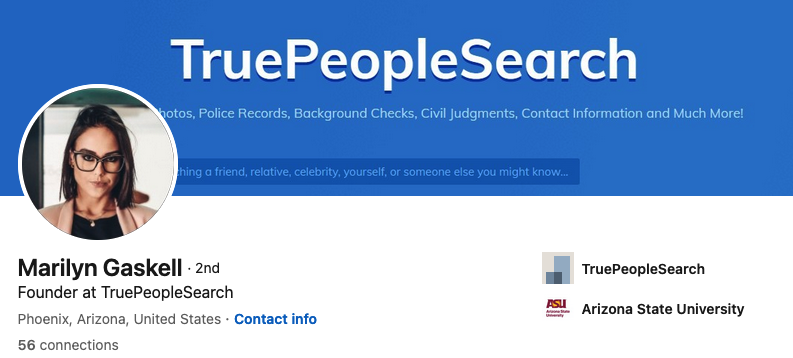
The saucy yet studious LinkedIn profile for Marilyn Gaskell.
Ms. Gaskell has been quoted in multiple “articles” about random subjects, such as this article at HRDailyAdvisor about the pros and cons of joining a company-led fantasy football team.
“Marilyn Gaskell, founder of TruePeopleSearch, agrees that not everyone in the office is likely to be a football fan and might feel intimidated by joining a company league or left out if they don’t join; however, her company looked for ways to make the activity more inclusive,” this paid story notes.
Also quoted in this article is Sally Stevens, who is cited as HR Manager at FastPeopleSearch[.]io.
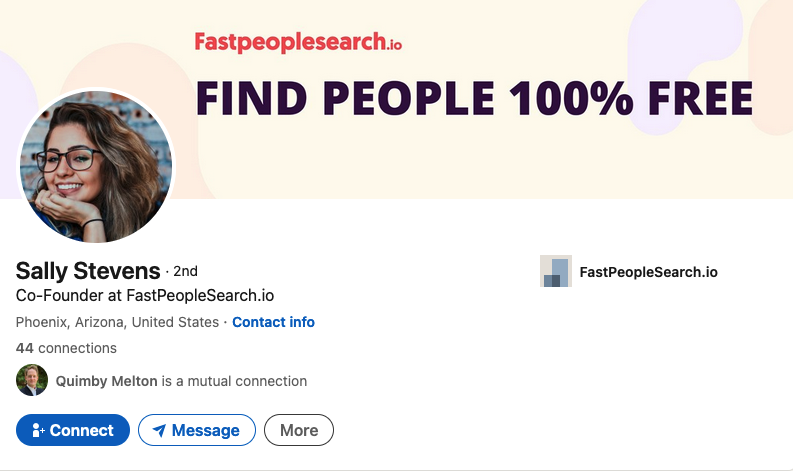
Sally Stevens, the phantom HR Manager for FastPeopleSearch.
“Fantasy football provides one way for employees to set aside work matters for some time and have fun,” Stevens contributed. “Employees can set a special league for themselves and regularly check and compare their scores against one another.”
Imagine that: Two different people-search companies mentioned in the same story about fantasy football. What are the odds?
Both TruePeopleSearch and FastPeopleSearch allow users to search for reports by first and last name, but proceeding to order a report prompts the visitor to purchase the file from one of several established people-finder services, including BeenVerified, Intelius, and Spokeo.
DomainTools.com shows that both TruePeopleSearch and FastPeopleSearch appeared around 2020 and were registered through Alibaba Cloud, in Beijing, China. No other information is available about these domains in their registration records, although both domains appear to use email servers based in China.
Sally Stevens’ LinkedIn profile photo is identical to a stock image titled “beautiful girl” from Adobe.com. Ms. Stevens is also quoted in a paid blog post at ecogreenequipment.com, as is Alina Clark, co-founder and marketing director of CocoDoc, an online service for editing and managing PDF documents.

The profile photo for Alina Clark is a stock photo appearing on more than 100 websites.
Scouring multiple image search sites reveals Ms. Clark’s profile photo on LinkedIn is another stock image that is currently on more than 100 different websites, including Adobe.com. Cocodoc[.]com was registered in June 2020 via Alibaba Cloud Beijing in China.
The same Alina Clark and photo materialized in a paid article at the website Ceoblognation, which in 2021 included her at #11 in a piece called “30 Entrepreneurs Describe The Big Hairy Audacious Goals (BHAGs) for Their Business.” It’s also worth noting that Ms. Clark is currently listed as a “former Forbes Council member” at the media outlet Forbes.com.
Entrepreneur #6 is Stephen Curry, who is quoted as CEO of CocoSign[.]com, a website that claims to offer an “easier, quicker, safer eSignature solution for small and medium-sized businesses.” Incidentally, the same photo for Stephen Curry #6 is also used in this “article” for #22 Jake Smith, who is named as the owner of a different company.

Stephen Curry, aka Jake Smith, aka no such person.
Mr. Curry’s LinkedIn profile shows a young man seated at a table in front of a laptop, but an online image search shows this is another stock photo. Cocosign[.]com was registered in June 2020 via Alibaba Cloud Beijing. No ownership details are available in the domain registration records.
Listed at #13 in that 30 Entrepreneurs article is Eden Cheng, who is cited as co-founder of PeopleFinderFree[.]com. KrebsOnSecurity could not find a LinkedIn profile for Ms. Cheng, but a search on her profile image from that Entrepreneurs article shows the same photo for sale at Shutterstock and other stock photo sites.
DomainTools says PeopleFinderFree was registered through Alibaba Cloud, Beijing. Attempts to purchase reports through PeopleFinderFree produce a notice saying the full report is only available via Spokeo.com.
Lynda Fairly is Entrepreneur #24, and she is quoted as co-founder of Numlooker[.]com, a domain registered in April 2021 through Alibaba in China. Searches for people on Numlooker forward visitors to Spokeo.
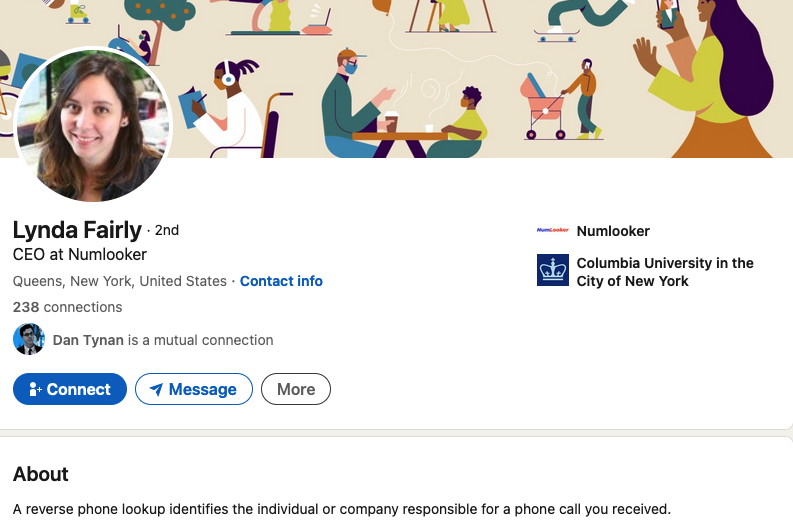
The photo next to Ms. Fairly’s quote in Entrepreneurs matches that of a LinkedIn profile for Lynda Fairly. But a search on that photo shows this same portrait has been used by many other identities and names, including a woman from the United Kingdom who’s a cancer survivor and mother of five; a licensed marriage and family therapist in Canada; a software security engineer at Quora; a journalist on Twitter/X; and a marketing expert in Canada.
Cocofinder[.]com is a people-search service that launched in Sept. 2019, through Alibaba in China. Cocofinder lists its market officer as Harriet Chan, but Ms. Chan’s LinkedIn profile is just as sparse on work history as the other people-search owners mentioned already. An image search online shows that outside of LinkedIn, the profile photo for Ms. Chan has only ever appeared in articles at pay-to-play media sites, like this one from outbackteambuilding.com.
Perhaps because Cocodoc and Cocosign both sell software services, they are actually tied to a physical presence in the real world — in Singapore (15 Scotts Rd. #03-12 15, Singapore). But it’s difficult to discern much from this address alone.
Who’s behind all this people-search chicanery? A January 2024 review of various people-search services at the website techjury.com states that Cocofinder is a wholly-owned subsidiary of a Chinese company called Shenzhen Duiyun Technology Co.
“Though it only finds results from the United States, users can choose between four main search methods,” Techjury explains. Those include people search, phone, address and email lookup. This claim is supported by a Reddit post from three years ago, wherein the Reddit user “ProtectionAdvanced” named the same Chinese company.
Is Shenzhen Duiyun Technology Co. responsible for all these phony profiles? How many more fake companies and profiles are connected to this scheme? KrebsOnSecurity found other examples that didn’t appear directly tied to other fake executives listed here, but which nevertheless are registered through Alibaba and seek to drive traffic to Spokeo and other data brokers. For example, there’s the winsome Daniela Sawyer, founder of FindPeopleFast[.]net, whose profile is flogged in paid stories at entrepreneur.org.
Google currently turns up nothing else for in a search for Shenzhen Duiyun Technology Co. Please feel free to sound off in the comments if you have any more information about this entity, such as how to contact it. Or reach out directly at krebsonsecurity @ gmail.com.

A mind map highlighting the key points of research in this story. Click to enlarge. Image: KrebsOnSecurity.com
It appears the purpose of this network is to conceal the location of people in China who are seeking to generate affiliate commissions when someone visits one of their sites and purchases a people-search report at Spokeo, for example. And it is clear that Spokeo and others have created incentives wherein anyone can effectively white-label their reports, and thereby make money brokering access to peoples’ personal information.
Spokeo’s Wikipedia page says the company was founded in 2006 by four graduates from Stanford University. Spokeo co-founder and current CEO Harrison Tang has not yet responded to requests for comment.
Intelius is owned by San Diego based PeopleConnect Inc., which also owns Classmates.com, USSearch, TruthFinder and Instant Checkmate. PeopleConnect Inc. in turn is owned by H.I.G. Capital, a $60 billion private equity firm. Requests for comment were sent to H.I.G. Capital. This story will be updated if they respond.
BeenVerified is owned by a New York City based holding company called The Lifetime Value Co., a marketing and advertising firm whose brands include PeopleLooker, NeighborWho, Ownerly, PeopleSmart, NumberGuru, and Bumper, a car history site.
Ross Cohen, chief operating officer at The Lifetime Value Co., said it’s likely the network of suspicious people-finder sites was set up by an affiliate. Cohen said Lifetime Value would investigate to determine if this particular affiliate was driving them any sign-ups.
All of the above people-search services operate similarly. When you find the person you’re looking for, you are put through a lengthy (often 10-20 minute) series of splash screens that require you to agree that these reports won’t be used for employment screening or in evaluating new tenant applications. Still more prompts ask if you are okay with seeing “potentially shocking” details about the subject of the report, including arrest histories and photos.
Only at the end of this process does the site disclose that viewing the report in question requires signing up for a monthly subscription, which is typically priced around $35. Exactly how and from where these major people-search websites are getting their consumer data — and customers — will be the subject of further reporting here.
The main reason these various people-search sites require you to affirm that you won’t use their reports for hiring or vetting potential tenants is that selling reports for those purposes would classify these firms as consumer reporting agencies (CRAs) and expose them to regulations under the Fair Credit Reporting Act (FCRA).
These data brokers do not want to be treated as CRAs, and for this reason their people search reports typically don’t include detailed credit histories, financial information, or full Social Security Numbers (Radaris reports include the first six digits of one’s SSN).
But in September 2023, the U.S. Federal Trade Commission found that TruthFinder and Instant Checkmate were trying to have it both ways. The FTC levied a $5.8 million penalty against the companies for allegedly acting as CRAs because they assembled and compiled information on consumers into background reports that were marketed and sold for employment and tenant screening purposes.
The FTC also found TruthFinder and Instant Checkmate deceived users about background report accuracy. The FTC alleges these companies made millions from their monthly subscriptions using push notifications and marketing emails that claimed that the subject of a background report had a criminal or arrest record, when the record was merely a traffic ticket.
The FTC said both companies deceived customers by providing “Remove” and “Flag as Inaccurate” buttons that did not work as advertised. Rather, the “Remove” button removed the disputed information only from the report as displayed to that customer; however, the same item of information remained visible to other customers who searched for the same person.
The FTC also said that when a customer flagged an item in the background report as inaccurate, the companies never took any steps to investigate those claims, to modify the reports, or to flag to other customers that the information had been disputed.
There are a growing number of online reputation management companies that offer to help customers remove their personal information from people-search sites and data broker databases. There are, no doubt, plenty of honest and well-meaning companies operating in this space, but it has been my experience that a great many people involved in that industry have a background in marketing or advertising — not privacy.
Also, some so-called data privacy companies may be wolves in sheep’s clothing. On March 14, KrebsOnSecurity published an abundance of evidence indicating that the CEO and founder of the data privacy company OneRep.com was responsible for launching dozens of people-search services over the years.
Finally, some of the more popular people-search websites are notorious for ignoring requests from consumers seeking to remove their information, regardless of which reputation or removal service you use. Some force you to create an account and provide more information before you can remove your data. Even then, the information you worked hard to remove may simply reappear a few months later.
This aptly describes countless complaints lodged against the data broker and people search giant Radaris. On March 8, KrebsOnSecurity profiled the co-founders of Radaris, two Russian brothers in Massachusetts who also operate multiple Russian-language dating services and affiliate programs.
The truth is that these people-search companies will continue to thrive unless and until Congress begins to realize it’s time for some consumer privacy and data protection laws that are relevant to life in the 21st century. Duke University adjunct professor Justin Sherman says virtually all state privacy laws exempt records that might be considered “public” or “government” documents, including voting registries, property filings, marriage certificates, motor vehicle records, criminal records, court documents, death records, professional licenses, bankruptcy filings, and more.
“Consumer privacy laws in California, Colorado, Connecticut, Delaware, Indiana, Iowa, Montana, Oregon, Tennessee, Texas, Utah, and Virginia all contain highly similar or completely identical carve-outs for ‘publicly available information’ or government records,” Sherman said.
There has been an exponential increase in breaches within enterprises despite the carefully constructed and controlled perimeters that exist around applications and data. Once an attacker can access… Read more on Cisco Blogs

Join the guided tour outside the Security Operations Center, where we’ll discuss real time network traffic of the RSA Conference, as seen in the NetWitness platform. Engineers will be using Cisco S… Read more on Cisco Blogs

The data privacy company Onerep.com bills itself as a Virginia-based service for helping people remove their personal information from almost 200 people-search websites. However, an investigation into the history of onerep.com finds this company is operating out of Belarus and Cyprus, and that its founder has launched dozens of people-search services over the years.
Onerep’s “Protect” service starts at $8.33 per month for individuals and $15/mo for families, and promises to remove your personal information from nearly 200 people-search sites. Onerep also markets its service to companies seeking to offer their employees the ability to have their data continuously removed from people-search sites.

A testimonial on onerep.com.
Customer case studies published on onerep.com state that it struck a deal to offer the service to employees of Permanente Medicine, which represents the doctors within the health insurance giant Kaiser Permanente. Onerep also says it has made inroads among police departments in the United States.
But a review of Onerep’s domain registration records and that of its founder reveal a different side to this company. Onerep.com says its founder and CEO is Dimitri Shelest from Minsk, Belarus, as does Shelest’s profile on LinkedIn. Historic registration records indexed by DomainTools.com say Mr. Shelest was a registrant of onerep.com who used the email address dmitrcox2@gmail.com.
A search in the data breach tracking service Constella Intelligence for the name Dimitri Shelest brings up the email address dimitri.shelest@onerep.com. Constella also finds that Dimitri Shelest from Belarus used the email address d.sh@nuwber.com, and the Belarus phone number +375-292-702786.
Nuwber.com is a people search service whose employees all appear to be from Belarus, and it is one of dozens of people-search companies that Onerep claims to target with its data-removal service. Onerep.com’s website disavows any relationship to Nuwber.com, stating quite clearly, “Please note that OneRep is not associated with Nuwber.com.”
However, there is an abundance of evidence suggesting Mr. Shelest is in fact the founder of Nuwber. Constella found that Minsk telephone number (375-292-702786) has been used multiple times in connection with the email address dmitrcox@gmail.com. Recall that Onerep.com’s domain registration records in 2018 list the email address dmitrcox2@gmail.com.
It appears Mr. Shelest sought to reinvent his online identity in 2015 by adding a “2” to his email address. The Belarus phone number tied to Nuwber.com shows up in the domain records for comversus.com, and DomainTools says this domain is tied to both dmitrcox@gmail.com and dmitrcox2@gmail.com. Other domains that mention both email addresses in their WHOIS records include careon.me, docvsdoc.com, dotcomsvdot.com, namevname.com, okanyway.com and tapanyapp.com.

Onerep.com CEO and founder Dimitri Shelest, as pictured on the “about” page of onerep.com.
A search in DomainTools for the email address dmitrcox@gmail.com shows it is associated with the registration of at least 179 domain names, including dozens of mostly now-defunct people-search companies targeting citizens of Argentina, Brazil, Canada, Denmark, France, Germany, Hong Kong, Israel, Italy, Japan, Latvia and Mexico, among others.
Those include nuwber.fr, a site registered in 2016 which was identical to the homepage of Nuwber.com at the time. DomainTools shows the same email and Belarus phone number are in historic registration records for nuwber.at, nuwber.ch, and nuwber.dk (all domains linked here are to their cached copies at archive.org, where available).
Update, March 21, 11:15 a.m. ET: Mr. Shelest has provided a lengthy response to the findings in this story. In summary, Shelest acknowledged maintaining an ownership stake in Nuwber, but said there was “zero cross-over or information-sharing with OneRep.” Mr. Shelest said any other old domains that may be found and associated with his name are no longer being operated by him.
“I get it,” Shelest wrote. “My affiliation with a people search business may look odd from the outside. In truth, if I hadn’t taken that initial path with a deep dive into how people search sites work, Onerep wouldn’t have the best tech and team in the space. Still, I now appreciate that we did not make this more clear in the past and I’m aiming to do better in the future.” The full statement is available here (PDF).
Original story:
Historic WHOIS records for onerep.com show it was registered for many years to a resident of Sioux Falls, SD for a completely unrelated site. But around Sept. 2015 the domain switched from the registrar GoDaddy.com to eNom, and the registration records were hidden behind privacy protection services. DomainTools indicates around this time onerep.com started using domain name servers from DNS provider constellix.com. Likewise, Nuwber.com first appeared in late 2015, was also registered through eNom, and also started using constellix.com for DNS at nearly the same time.
Listed on LinkedIn as a former product manager at OneRep.com between 2015 and 2018 is Dimitri Bukuyazau, who says their hometown is Warsaw, Poland. While this LinkedIn profile (linkedin.com/in/dzmitrybukuyazau) does not mention Nuwber, a search on this name in Google turns up a 2017 blog post from privacyduck.com, which laid out a number of reasons to support a conclusion that OneRep and Nuwber.com were the same company.
“Any people search profiles containing your Personally Identifiable Information that were on Nuwber.com were also mirrored identically on OneRep.com, down to the relatives’ names and address histories,” Privacyduck.com wrote. The post continued:
“Both sites offered the same immediate opt-out process. Both sites had the same generic contact and support structure. They were – and remain – the same company (even PissedConsumer.com advocates this fact: https://nuwber.pissedconsumer.com/nuwber-and-onerep-20160707878520.html).”
“Things changed in early 2016 when OneRep.com began offering privacy removal services right alongside their own open displays of your personal information. At this point when you found yourself on Nuwber.com OR OneRep.com, you would be provided with the option of opting-out your data on their site for free – but also be highly encouraged to pay them to remove it from a slew of other sites (and part of that payment was removing you from their own site, Nuwber.com, as a benefit of their service).”
Reached via LinkedIn, Mr. Bukuyazau declined to answer questions, such as whether he ever worked at Nuwber.com. However, Constella Intelligence finds two interesting email addresses for employees at nuwber.com: d.bu@nuwber.com, and d.bu+figure-eight.com@nuwber.com, which was registered under the name “Dzmitry.”
PrivacyDuck’s claims about how onerep.com appeared and behaved in the early days are not readily verifiable because the domain onerep.com has been completely excluded from the Wayback Machine at archive.org. The Wayback Machine will honor such requests if they come directly from the owner of the domain in question.
Still, Mr. Shelest’s name, phone number and email also appear in the domain registration records for a truly dizzying number of country-specific people-search services, including pplcrwlr.in, pplcrwlr.fr, pplcrwlr.dk, pplcrwlr.jp, peeepl.br.com, peeepl.in, peeepl.it and peeepl.co.uk.
The same details appear in the WHOIS registration records for the now-defunct people-search sites waatpp.de, waatp1.fr, azersab.com, and ahavoila.com, a people-search service for French citizens.
A search on the email address dmitrcox@gmail.com suggests Mr. Shelest was previously involved in rather aggressive email marketing campaigns. In 2010, an anonymous source leaked to KrebsOnSecurity the financial and organizational records of Spamit, which at the time was easily the largest Russian-language pharmacy spam affiliate program in the world.
Spamit paid spammers a hefty commission every time someone bought male enhancement drugs from any of their spam-advertised websites. Mr. Shelest’s email address stood out because immediately after the Spamit database was leaked, KrebsOnSecurity searched all of the Spamit affiliate email addresses to determine if any of them corresponded to social media accounts at Facebook.com (at the time, Facebook allowed users to search profiles by email address).
That mapping, which was done mainly by generous graduate students at my alma mater George Mason University, revealed that dmitrcox@gmail.com was used by a Spamit affiliate, albeit not a very profitable one. That same Facebook profile for Mr. Shelest is still active, and it says he is married and living in Minsk [Update, Mar. 16: Mr. Shelest’s Facebook account is no longer active].
Scrolling down Mr. Shelest’s Facebook page to posts made more than ten years ago show him liking the Facebook profile pages for a large number of other people-search sites, including findita.com, findmedo.com, folkscan.com, huntize.com, ifindy.com, jupery.com, look2man.com, lookerun.com, manyp.com, peepull.com, perserch.com, persuer.com, pervent.com, piplenter.com, piplfind.com, piplscan.com, popopke.com, pplsorce.com, qimeo.com, scoutu2.com, search64.com, searchay.com, seekmi.com, selfabc.com, socsee.com, srching.com, toolooks.com, upearch.com, webmeek.com, and many country-code variations of viadin.ca (e.g. viadin.hk, viadin.com and viadin.de).
Domaintools.com finds that all of the domains mentioned in the last paragraph were registered to the email address dmitrcox@gmail.com.
Mr. Shelest has not responded to multiple requests for comment. KrebsOnSecurity also sought comment from onerep.com, which likewise has not responded to inquiries about its founder’s many apparent conflicts of interest. In any event, these practices would seem to contradict the goal Onerep has stated on its site: “We believe that no one should compromise personal online security and get a profit from it.”
Max Anderson is chief growth officer at 360 Privacy, a legitimate privacy company that works to keep its clients’ data off of more than 400 data broker and people-search sites. Anderson said it is concerning to see a direct link between between a data removal service and data broker websites.
“I would consider it unethical to run a company that sells people’s information, and then charge those same people to have their information removed,” Anderson said.
Last week, KrebsOnSecurity published an analysis of the people-search data broker giant Radaris, whose consumer profiles are deep enough to rival those of far more guarded data broker resources available to U.S. police departments and other law enforcement personnel.
That story revealed that the co-founders of Radaris are two native Russian brothers who operate multiple Russian-language dating services and affiliate programs. It also appears many of the Radaris founders’ businesses have ties to a California marketing firm that works with a Russian state-run media conglomerate currently sanctioned by the U.S. government.

KrebsOnSecurity will continue investigating the history of various consumer data brokers and people-search providers. If any readers have inside knowledge of this industry or key players within it, please consider reaching out to krebsonsecurity at gmail.com.
Update, March 15, 11:35 a.m. ET: Many readers have pointed out something that was somehow overlooked amid all this research: The Mozilla Foundation, the company that runs the Firefox Web browser, has launched a data removal service called Mozilla Monitor that bundles OneRep. That notice says Mozilla Monitor is offered as a free or paid subscription service.
“The free data breach notification service is a partnership with Have I Been Pwned (“HIBP”),” the Mozilla Foundation explains. “The automated data deletion service is a partnership with OneRep to remove personal information published on publicly available online directories and other aggregators of information about individuals (“Data Broker Sites”).”
In a statement shared with KrebsOnSecurity.com, Mozilla said they did assess OneRep’s data removal service to confirm it acts according to privacy principles advocated at Mozilla.
“We were aware of the past affiliations with the entities named in the article and were assured they had ended prior to our work together,” the statement reads. “We’re now looking into this further. We will always put the privacy and security of our customers first and will provide updates as needed.”
Apple and Microsoft recently released software updates to fix dozens of security holes in their operating systems. Microsoft today patched at least 60 vulnerabilities in its Windows OS. Meanwhile, Apple’s new macOS Sonoma addresses at least 68 security weaknesses, and its latest update for iOS fixes two zero-day flaws.

Last week, Apple pushed out an urgent software update to its flagship iOS platform, warning that there were at least two zero-day exploits for vulnerabilities being used in the wild (CVE-2024-23225 and CVE-2024-23296). The security updates are available in iOS 17.4, iPadOS 17.4, and iOS 16.7.6.
Apple’s macOS Sonoma 14.4 Security Update addresses dozens of security issues. Jason Kitka, chief information security officer at Automox, said the vulnerabilities patched in this update often stem from memory safety issues, a concern that has led to a broader industry conversation about the adoption of memory-safe programming languages [full disclosure: Automox is an advertiser on this site].
On Feb. 26, 2024, the Biden administration issued a report that calls for greater adoption of memory-safe programming languages. On Mar. 4, 2024, Google published Secure by Design, which lays out the company’s perspective on memory safety risks.
Mercifully, there do not appear to be any zero-day threats hounding Windows users this month (at least not yet). Satnam Narang, senior staff research engineer at Tenable, notes that of the 60 CVEs in this month’s Patch Tuesday release, only six are considered “more likely to be exploited” according to Microsoft.
Those more likely to be exploited bugs are mostly “elevation of privilege vulnerabilities” including CVE-2024-26182 (Windows Kernel), CVE-2024-26170 (Windows Composite Image File System (CimFS), CVE-2024-21437 (Windows Graphics Component), and CVE-2024-21433 (Windows Print Spooler).
Narang highlighted CVE-2024-21390 as a particularly interesting vulnerability in this month’s Patch Tuesday release, which is an elevation of privilege flaw in Microsoft Authenticator, the software giant’s app for multi-factor authentication. Narang said a prerequisite for an attacker to exploit this flaw is to already have a presence on the device either through malware or a malicious application.
“If a victim has closed and re-opened the Microsoft Authenticator app, an attacker could obtain multi-factor authentication codes and modify or delete accounts from the app,” Narang said. “Having access to a target device is bad enough as they can monitor keystrokes, steal data and redirect users to phishing websites, but if the goal is to remain stealth, they could maintain this access and steal multi-factor authentication codes in order to login to sensitive accounts, steal data or hijack the accounts altogether by changing passwords and replacing the multi-factor authentication device, effectively locking the user out of their accounts.”
CVE-2024-21334 earned a CVSS (danger) score of 9.8 (10 is the worst), and it concerns a weakness in Open Management Infrastructure (OMI), a Linux-based cloud infrastructure in Microsoft Azure. Microsoft says attackers could connect to OMI instances over the Internet without authentication, and then send specially crafted data packets to gain remote code execution on the host device.
CVE-2024-21435 is a CVSS 8.8 vulnerability in Windows OLE, which acts as a kind of backbone for a great deal of communication between applications that people use every day on Windows, said Ben McCarthy, lead cybersecurity engineer at Immersive Labs.
“With this vulnerability, there is an exploit that allows remote code execution, the attacker needs to trick a user into opening a document, this document will exploit the OLE engine to download a malicious DLL to gain code execution on the system,” Breen explained. “The attack complexity has been described as low meaning there is less of a barrier to entry for attackers.”
A full list of the vulnerabilities addressed by Microsoft this month is available at the SANS Internet Storm Center, which breaks down the updates by severity and urgency.
Finally, Adobe today issued security updates that fix dozens of security holes in a wide range of products, including Adobe Experience Manager, Adobe Premiere Pro, ColdFusion 2023 and 2021, Adobe Bridge, Lightroom, and Adobe Animate. Adobe said it is not aware of active exploitation against any of the flaws.
By the way, Adobe recently enrolled all of its Acrobat users into a “new generative AI feature” that scans the contents of your PDFs so that its new “AI Assistant” can “understand your questions and provide responses based on the content of your PDF file.” Adobe provides instructions on how to disable the AI features and opt out here.

Borrowing from the playbook of ransomware purveyors, the darknet narcotics bazaar Incognito Market has begun extorting all of its vendors and buyers, threatening to publish cryptocurrency transaction and chat records of users who refuse to pay a fee ranging from $100 to $20,000. The bold mass extortion attempt comes just days after Incognito Market administrators reportedly pulled an “exit scam” that left users unable to withdraw millions of dollars worth of funds from the platform.

An extortion message currently on the Incognito Market homepage.
In the past 24 hours, the homepage for the Incognito Market was updated to include a blackmail message from its owners, saying they will soon release purchase records of vendors who refuse to pay to keep the records confidential.
“We got one final little nasty surprise for y’all,” reads the message to Incognito Market users. “We have accumulated a list of private messages, transaction info and order details over the years. You’ll be surprised at the number of people that relied on our ‘auto-encrypt’ functionality. And by the way, your messages and transaction IDs were never actually deleted after the ‘expiry’….SURPRISE SURPRISE!!! Anyway, if anything were to leak to law enforcement, I guess nobody never slipped up.”
Incognito Market says it plans to publish the entire dump of 557,000 orders and 862,000 cryptocurrency transaction IDs at the end of May.
“Whether or not you and your customers’ info is on that list is totally up to you,” the Incognito administrators advised. “And yes, this is an extortion!!!!”
The extortion message includes a “Payment Status” page that lists the darknet market’s top vendors by their handles, saying at the top that “you can see which vendors care about their customers below.” The names in green supposedly correspond to users who have already opted to pay.
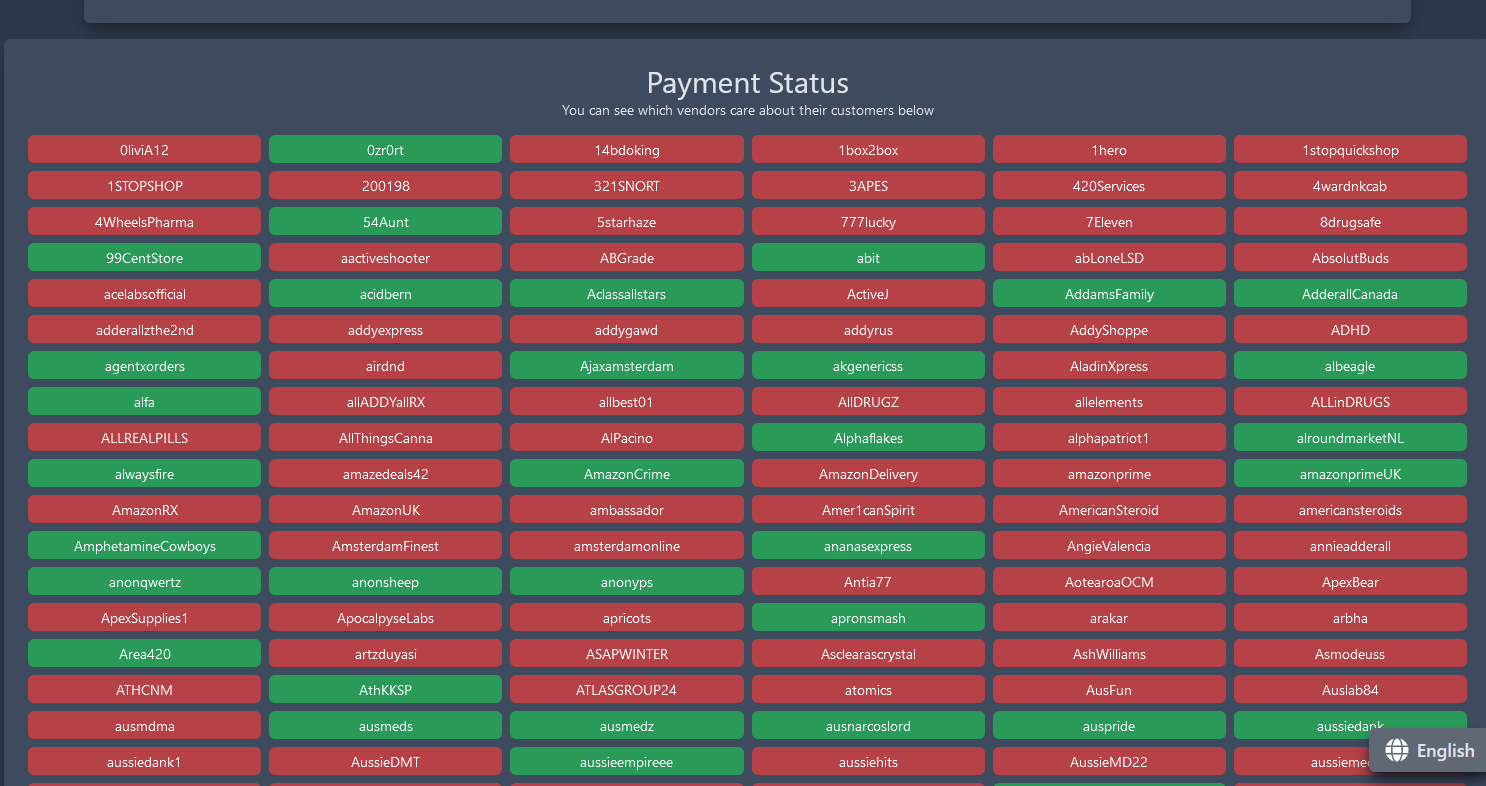
The “Payment Status” page set up by the Incognito Market extortionists.
We’ll be publishing the entire dump of 557k orders and 862k crypto transaction IDs at the end of May, whether or not you and your customers’ info is on that list is totally up to you. And yes, this is an extortion!!!!
Incognito Market said it plans to open up a “whitelist portal” for buyers to remove their transaction records “in a few weeks.”
The mass-extortion of Incognito Market users comes just days after a large number of users reported they were no longer able to withdraw funds from their buyer or seller accounts. The cryptocurrency-focused publication Cointelegraph.com reported Mar. 6 that Incognito was exit-scamming its users out of their bitcoins and Monero deposits.
CoinTelegraph notes that Incognito Market administrators initially lied about the situation, and blamed users’ difficulties in withdrawing funds on recent changes to Incognito’s withdrawal systems.
Incognito Market deals primarily in narcotics, so it’s likely many users are now worried about being outed as drug dealers. Creating a new account on Incognito Market presents one with an ad for 5 grams of heroin selling for $450.

New Incognito Market users are treated to an ad for $450 worth of heroin.
The double whammy now hitting Incognito Market users is somewhat akin to the double extortion techniques employed by many modern ransomware groups, wherein victim organizations are hacked, relieved of sensitive information and then presented with two separate ransom demands: One in exchange for a digital key needed to unlock infected systems, and another to secure a promise that any stolen data will not be published or sold, and will be destroyed.
Incognito Market has priced its extortion for vendors based on their status or “level” within the marketplace. Level 1 vendors can supposedly have their information removed by paying a $100 fee. However, larger “Level 5” vendors are asked to cough up $20,000 payments.

The past is replete with examples of similar darknet market exit scams, which tend to happen eventually to all darknet markets that aren’t seized and shut down by federal investigators, said Brett Johnson, a convicted and reformed cybercriminal who built the organized cybercrime community Shadowcrew many years ago.
“Shadowcrew was the precursor to today’s Darknet Markets and laid the foundation for the way modern cybercrime channels still operate today,” Johnson said. “The Truth of Darknet Markets? ALL of them are Exit Scams. The only question is whether law enforcement can shut down the market and arrest its operators before the exit scam takes place.”
If you live in the United States, the data broker Radaris likely knows a great deal about you, and they are happy to sell what they know to anyone. But how much do we know about Radaris? Publicly available data indicates that in addition to running a dizzying array of people-search websites, the co-founders of Radaris operate multiple Russian-language dating services and affiliate programs. It also appears many of their businesses have ties to a California marketing firm that works with a Russian state-run media conglomerate currently sanctioned by the U.S. government.
Formed in 2009, Radaris is a vast people-search network for finding data on individuals, properties, phone numbers, businesses and addresses. Search for any American’s name in Google and the chances are excellent that a listing for them at Radaris.com will show up prominently in the results.
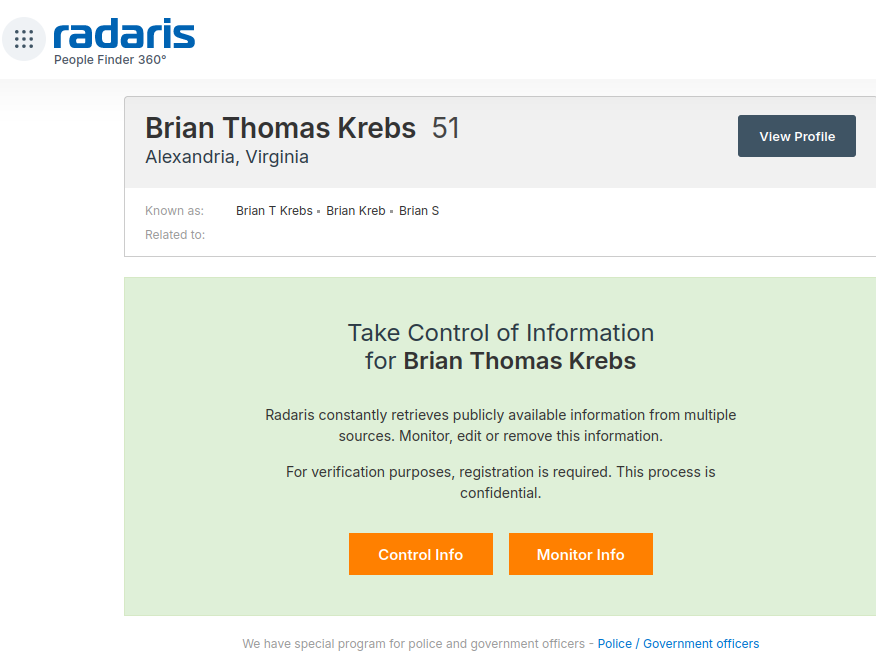
Radaris reports typically bundle a substantial amount of data scraped from public and court documents, including any current or previous addresses and phone numbers, known email addresses and registered domain names. The reports also list address and phone records for the target’s known relatives and associates. Such information could be useful if you were trying to determine the maiden name of someone’s mother, or successfully answer a range of other knowledge-based authentication questions.
Currently, consumer reports advertised for sale at Radaris.com are being fulfilled by a different people-search company called TruthFinder. But Radaris also operates a number of other people-search properties — like Centeda.com — that sell consumer reports directly and behave almost identically to TruthFinder: That is, reel the visitor in with promises of detailed background reports on people, and then charge a $34.99 monthly subscription fee just to view the results.
The Better Business Bureau (BBB) assigns Radaris a rating of “F” for consistently ignoring consumers seeking to have their information removed from Radaris’ various online properties. Of the 159 complaints detailed there in the last year, several were from people who had used third-party identity protection services to have their information removed from Radaris, only to receive a notice a few months later that their Radaris record had been restored.
What’s more, Radaris’ automated process for requesting the removal of your information requires signing up for an account, potentially providing more information about yourself that the company didn’t already have (see screenshot above).
Radaris has not responded to requests for comment.
Radaris, TruthFinder and others like them all force users to agree that their reports will not be used to evaluate someone’s eligibility for credit, or a new apartment or job. This language is so prominent in people-search reports because selling reports for those purposes would classify these firms as consumer reporting agencies (CRAs) and expose them to regulations under the Fair Credit Reporting Act (FCRA).
These data brokers do not want to be treated as CRAs, and for this reason their people search reports typically do not include detailed credit histories, financial information, or full Social Security Numbers (Radaris reports include the first six digits of one’s SSN).
But in September 2023, the U.S. Federal Trade Commission found that TruthFinder and another people-search service Instant Checkmate were trying to have it both ways. The FTC levied a $5.8 million penalty against the companies for allegedly acting as CRAs because they assembled and compiled information on consumers into background reports that were marketed and sold for employment and tenant screening purposes.

An excerpt from the FTC’s complaint against TruthFinder and Instant Checkmate.
The FTC also found TruthFinder and Instant Checkmate deceived users about background report accuracy. The FTC alleges these companies made millions from their monthly subscriptions using push notifications and marketing emails that claimed that the subject of a background report had a criminal or arrest record, when the record was merely a traffic ticket.
“All the while, the companies touted the accuracy of their reports in online ads and other promotional materials, claiming that their reports contain “the MOST ACCURATE information available to the public,” the FTC noted. The FTC says, however, that all the information used in their background reports is obtained from third parties that expressly disclaim that the information is accurate, and that TruthFinder and Instant Checkmate take no steps to verify the accuracy of the information.
The FTC said both companies deceived customers by providing “Remove” and “Flag as Inaccurate” buttons that did not work as advertised. Rather, the “Remove” button removed the disputed information only from the report as displayed to that customer; however, the same item of information remained visible to other customers who searched for the same person.
The FTC also said that when a customer flagged an item in the background report as inaccurate, the companies never took any steps to investigate those claims, to modify the reports, or to flag to other customers that the information had been disputed.
According to Radaris’ profile at the investor website Pitchbook.com, the company’s founder and “co-chief executive officer” is a Massachusetts resident named Gary Norden, also known as Gary Nard.
An analysis of email addresses known to have been used by Mr. Norden shows he is a native Russian man whose real name is Igor Lybarsky (also spelled Lubarsky). Igor’s brother Dmitry, who goes by “Dan,” appears to be the other co-CEO of Radaris. Dmitry Lybarsky’s Facebook/Meta account says he was born in March 1963.

The Lybarsky brothers Dmitry or “Dan” (left) and Igor a.k.a. “Gary,” in an undated photo.
Indirectly or directly, the Lybarskys own multiple properties in both Sherborn and Wellesley, Mass. However, the Radaris website is operated by an offshore entity called Bitseller Expert Ltd, which is incorporated in Cyprus. Neither Lybarsky brother responded to requests for comment.
A review of the domain names registered by Gary Norden shows that beginning in the early 2000s, he and Dan built an e-commerce empire by marketing prepaid calling cards and VOIP services to Russian expatriates who are living in the United States and seeking an affordable way to stay in touch with loved ones back home.
In 2012, the main company in charge of providing those calling services — Wellesley Hills, Mass-based Unipoint Technology Inc. — was fined $179,000 by the U.S. Federal Communications Commission, which said Unipoint never applied for a license to provide international telecommunications services.
DomainTools.com shows the email address gnard@unipointtech.com is tied to 137 domains, including radaris.com. DomainTools also shows that the email addresses used by Gary Norden for more than two decades — epop@comby.com, gary@barksy.com and gary1@eprofit.com, among others — appear in WHOIS registration records for an entire fleet of people-search websites, including: centeda.com, virtory.com, clubset.com, kworld.com, newenglandfacts.com, and pub360.com.
Still more people-search platforms tied to Gary Norden– like publicreports.com and arrestfacts.com — currently funnel interested customers to third-party search companies, such as TruthFinder and PersonTrust.com.
The email addresses used by Gary Nard/Gary Norden are also connected to a slew of data broker websites that sell reports on businesses, real estate holdings, and professionals, including bizstanding.com, homemetry.com, trustoria.com, homeflock.com, rehold.com, difive.com and projectlab.com.
Domain records indicate that Gary and Dan for many years operated a now-defunct pay-per-click affiliate advertising network called affiliate.ru. That entity used domain name servers tied to the aforementioned domains comby.com and eprofit.com, as did radaris.ru.
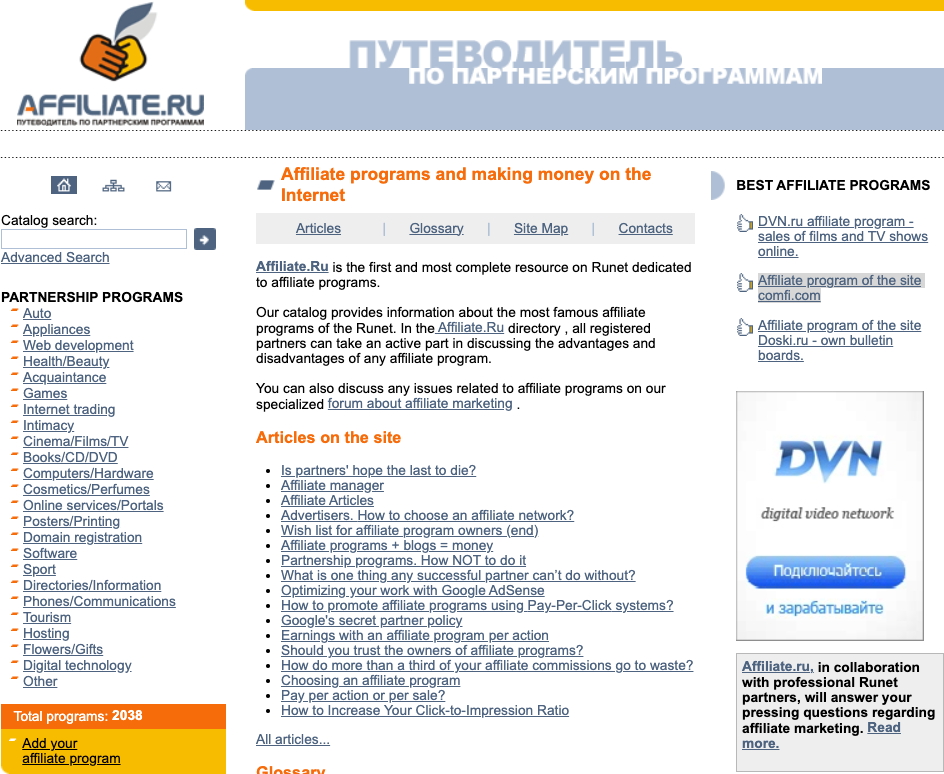
A machine-translated version of Affiliate.ru, a Russian-language site that advertised hundreds of money making affiliate programs, including the Comfi.com prepaid calling card affiliate.
Comby.com used to be a Russian language social media network that looked a great deal like Facebook. The domain now forwards visitors to Privet.ru (“hello” in Russian), a dating site that claims to have 5 million users. Privet.ru says it belongs to a company called Dating Factory, which lists offices in Switzerland. Privet.ru uses the Gary Norden domain eprofit.com for its domain name servers.
Dating Factory’s website says it sells “powerful dating technology” to help customers create unique or niche dating websites. A review of the sample images available on the Dating Factory homepage suggests the term “dating” in this context refers to adult websites. Dating Factory also operates a community called FacebookOfSex, as well as the domain analslappers.com.
Email addresses for the Comby and Eprofit domains indicate Gary Norden operates an entity in Wellesley Hills, Mass. called RussianAmerican Holding Inc. (russianamerica.com). This organization is listed as the owner of the domain newyork.ru, which is a site dedicated to orienting newcomers from Russia to the Big Apple.
Newyork.ru’s terms of service refer to an international calling card company called ComFi Inc. (comfi.com) and list an address as PO Box 81362 Wellesley Hills, Ma. Other sites that include this address are russianamerica.com, russianboston.com, russianchicago.com, russianla.com, russiansanfran.com, russianmiami.com, russiancleveland.com and russianseattle.com (currently offline).
ComFi is tied to Comfibook.com, which was a search aggregator website that collected and published data from many online and offline sources, including phone directories, social networks, online photo albums, and public records.
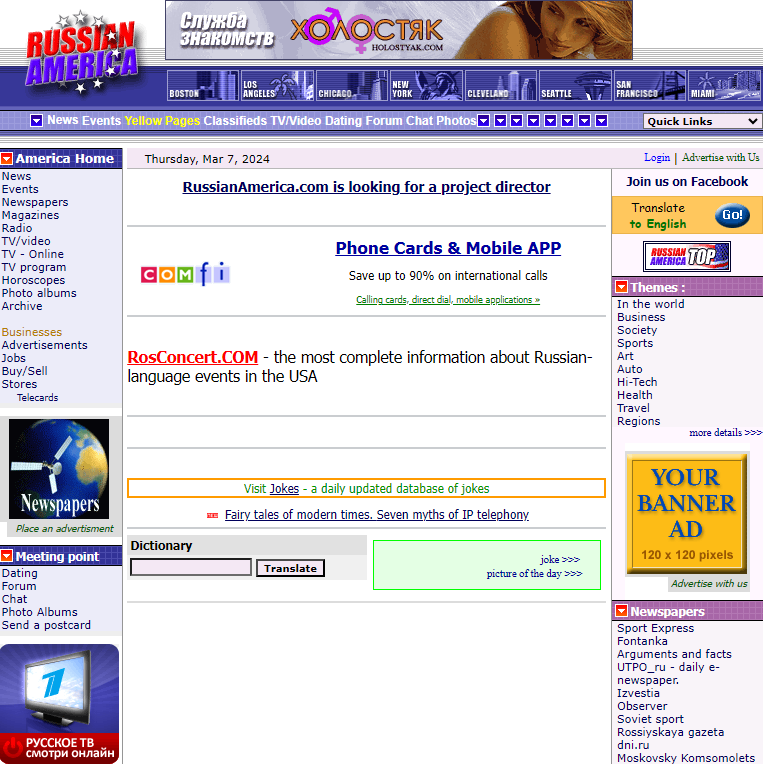
The current website for russianamerica.com. Note the ad in the bottom left corner of this image for Channel One, a Russian state-owned media firm that is currently sanctioned by the U.S. government.
Many of the U.S. city-specific online properties apparently tied to Gary Norden include phone numbers on their contact pages for a pair of Russian media and advertising firms based in southern California. The phone number 323-874-8211 appears on the websites russianla.com, russiasanfran.com, and rosconcert.com, which sells tickets to theater events performed in Russian.
Historic domain registration records from DomainTools show rosconcert.com was registered in 2003 to Unipoint Technologies — the same company fined by the FCC for not having a license. Rosconcert.com also lists the phone number 818-377-2101.
A phone number just a few digits away — 323-874-8205 — appears as a point of contact on newyork.ru, russianmiami.com, russiancleveland.com, and russianchicago.com. A search in Google shows this 82xx number range — and the 818-377-2101 number — belong to two different entities at the same UPS Store mailbox in Tarzana, Calif: American Russian Media Inc. (armediacorp.com), and Lamedia.biz.
Armediacorp.com is the home of FACT Magazine, a glossy Russian-language publication put out jointly by the American-Russian Business Council, the Hollywood Chamber of Commerce, and the West Hollywood Chamber of Commerce.
Lamedia.biz says it is an international media organization with more than 25 years of experience within the Russian-speaking community on the West Coast. The site advertises FACT Magazine and the Russian state-owned media outlet Channel One. Clicking the Channel One link on the homepage shows Lamedia.biz offers to submit advertising spots that can be shown to Channel One viewers. The price for a basic ad is listed at $500.
In May 2022, the U.S. government levied financial sanctions against Channel One that bar US companies or citizens from doing business with the company.

The website of lamedia.biz offers to sell advertising on two Russian state-owned media firms currently sanctioned by the U.S. government.
In 2014, a group of people sued Radaris in a class-action lawsuit claiming the company’s practices violated the Fair Credit Reporting Act. Court records indicate the defendants never showed up in court to dispute the claims, and as a result the judge eventually awarded the plaintiffs a default judgement and ordered the company to pay $7.5 million.
But the plaintiffs in that civil case had a difficult time collecting on the court’s ruling. In response, the court ordered the radaris.com domain name (~9.4M monthly visitors) to be handed over to the plaintiffs.
However, in 2018 Radaris was able to reclaim their domain on a technicality. Attorneys for the company argued that their clients were never named as defendants in the original lawsuit, and so their domain could not legally be taken away from them in a civil judgment.
“Because our clients were never named as parties to the litigation, and were never served in the litigation, the taking of their property without due process is a violation of their rights,” Radaris’ attorneys argued.
In October 2023, an Illinois resident filed a class-action lawsuit against Radaris for allegedly using people’s names for commercial purposes, in violation of the Illinois Right of Publicity Act.
On Feb. 8, 2024, a company called Atlas Data Privacy Corp. sued Radaris LLC for allegedly violating “Daniel’s Law,” a statute that allows New Jersey law enforcement, government personnel, judges and their families to have their information completely removed from people-search services and commercial data brokers. Atlas has filed at least 140 similar Daniel’s Law complaints against data brokers recently.
Daniel’s Law was enacted in response to the death of 20-year-old Daniel Anderl, who was killed in a violent attack targeting a federal judge (his mother). In July 2020, a disgruntled attorney who had appeared before U.S. District Judge Esther Salas disguised himself as a Fedex driver, went to her home and shot and killed her son (the judge was unharmed and the assailant killed himself).
Earlier this month, The Record reported on Atlas Data Privacy’s lawsuit against LexisNexis Risk Data Management, in which the plaintiffs representing thousands of law enforcement personnel in New Jersey alleged that after they asked for their information to remain private, the data broker retaliated against them by freezing their credit and falsely reporting them as identity theft victims.
Another data broker sued by Atlas Data Privacy — pogodata.com — announced on Mar. 1 that it was likely shutting down because of the lawsuit.
“The matter is far from resolved but your response motivates us to try to bring back most of the names while preserving redaction of the 17,000 or so clients of the redaction company,” the company wrote. “While little consolation, we are not alone in the suit – the privacy company sued 140 property-data sites at the same time as PogoData.”
Atlas says their goal is convince more states to pass similar laws, and to extend those protections to other groups such as teachers, healthcare personnel and social workers. Meanwhile, media law experts say they’re concerned that enacting Daniel’s Law in other states would limit the ability of journalists to hold public officials accountable, and allow authorities to pursue criminals charges against media outlets that publish the same type of public and governments records that fuel the people-search industry.
There are some pending changes to the US legal and regulatory landscape that could soon reshape large swaths of the data broker industry. But experts say it is unlikely that any of these changes will affect people-search companies like Radaris.
On Feb. 28, 2024, the White House issued an executive order that directs the U.S. Department of Justice (DOJ) to create regulations that would prevent data brokers from selling or transferring abroad certain data types deemed too sensitive, including genomic and biometric data, geolocation and financial data, as well as other as-yet unspecified personal identifiers. The DOJ this week published a list of more than 100 questions it is seeking answers to regarding the data broker industry.
In August 2023, the Consumer Financial Protection Bureau (CFPB) announced it was undertaking new rulemaking related to data brokers.
Justin Sherman, an adjunct professor at Duke University, said neither the CFPB nor White House rulemaking will likely address people-search brokers because these companies typically get their information by scouring federal, state and local government records. Those government files include voting registries, property filings, marriage certificates, motor vehicle records, criminal records, court documents, death records, professional licenses, bankruptcy filings, and more.
“These dossiers contain everything from individuals’ names, addresses, and family information to data about finances, criminal justice system history, and home and vehicle purchases,” Sherman wrote in an October 2023 article for Lawfare. “People search websites’ business pitch boils down to the fact that they have done the work of compiling data, digitizing it, and linking it to specific people so that it can be searched online.”
Sherman said while there are ongoing debates about whether people search data brokers have legal responsibilities to the people about whom they gather and sell data, the sources of this information — public records — are completely carved out from every single state consumer privacy law.
“Consumer privacy laws in California, Colorado, Connecticut, Delaware, Indiana, Iowa, Montana, Oregon, Tennessee, Texas, Utah, and Virginia all contain highly similar or completely identical carve-outs for ‘publicly available information’ or government records,” Sherman wrote. “Tennessee’s consumer data privacy law, for example, stipulates that “personal information,” a cornerstone of the legislation, does not include ‘publicly available information,’ defined as:
“…information that is lawfully made available through federal, state, or local government records, or information that a business has a reasonable basis to believe is lawfully made available to the general public through widely distributed media, by the consumer, or by a person to whom the consumer has disclosed the information, unless the consumer has restricted the information to a specific audience.”
Sherman said this is the same language as the carve-out in the California privacy regime, which is often held up as the national leader in state privacy regulations. He said with a limited set of exceptions for survivors of stalking and domestic violence, even under California’s newly passed Delete Act — which creates a centralized mechanism for consumers to ask some third-party data brokers to delete their information — consumers across the board cannot exercise these rights when it comes to data scraped from property filings, marriage certificates, and public court documents, for example.
“With some very narrow exceptions, it’s either extremely difficult or impossible to compel these companies to remove your information from their sites,” Sherman told KrebsOnSecurity. “Even in states like California, every single consumer privacy law in the country completely exempts publicly available information.”
Below is a mind map that helped KrebsOnSecurity track relationships between and among the various organizations named in the story above:
The proliferation of applications across hybrid and multicloud environments continues at a blistering pace. For the most part, there is no fixed perimeter, applications and environments are woven… Read more on Cisco Blogs

The ransomware group LockBit told officials with Fulton County, Ga. they could expect to see their internal documents published online this morning unless the county paid a ransom demand. LockBit removed Fulton County’s listing from its victim shaming website this morning, claiming the county had paid. But county officials said they did not pay, nor did anyone make payment on their behalf. Security experts say LockBit was likely bluffing and probably lost most of the data when the gang’s servers were seized this month by U.S. and U.K. law enforcement.
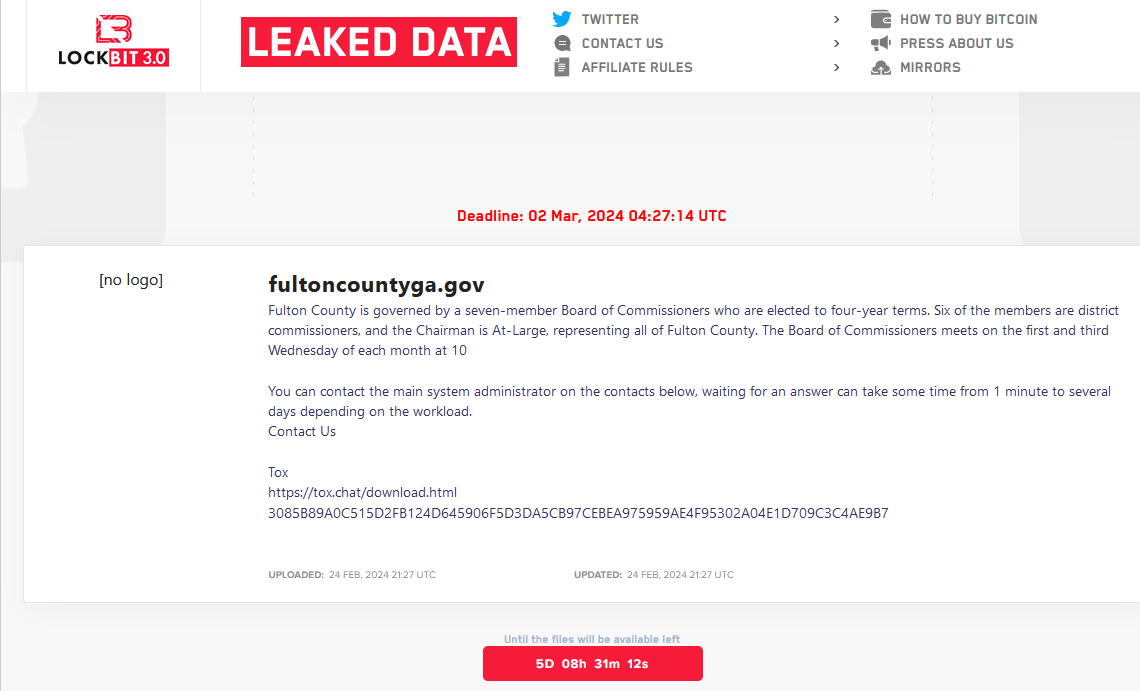
The LockBit website included a countdown timer until the promised release of data stolen from Fulton County, Ga. LockBit would later move this deadline up to Feb. 29, 2024.
LockBit listed Fulton County as a victim on Feb. 13, saying that unless it was paid a ransom the group would publish files stolen in a breach at the county last month. That attack disrupted county phones, Internet access and even their court system. LockBit leaked a small number of the county’s files as a teaser, which appeared to include sensitive and sealed court records in current and past criminal trials.
On Feb. 16, Fulton County’s entry — along with a countdown timer until the data would be published — was removed from the LockBit website without explanation. The leader of LockBit told KrebsOnSecurity this was because Fulton County officials had engaged in last-minute negotiations with the group.
But on Feb. 19, investigators with the FBI and the U.K.’s National Crime Agency (NCA) took over LockBit’s online infrastructure, replacing the group’s homepage with a seizure notice and links to LockBit ransomware decryption tools.
In a press briefing on Feb. 20, Fulton County Commission Chairman Robb Pitts told reporters the county did not pay a ransom demand, noting that the board “could not in good conscience use Fulton County taxpayer funds to make a payment.”
Three days later, LockBit reemerged with new domains on the dark web, and with Fulton County listed among a half-dozen other victims whose data was about to be leaked if they refused to pay. As it does with all victims, LockBit assigned Fulton County a countdown timer, saying officials had until late in the evening on March 1 until their data was published.
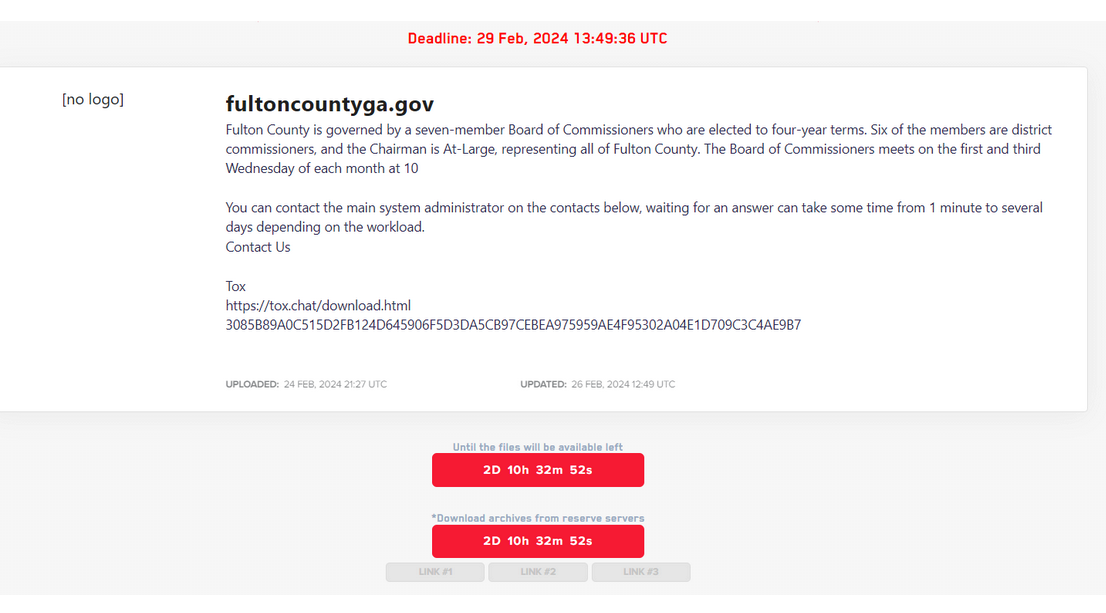
LockBit revised its deadline for Fulton County to Feb. 29.
LockBit soon moved up the deadline to the morning of Feb. 29. As Fulton County’s LockBit timer was counting down to zero this morning, its listing disappeared from LockBit’s site. LockBit’s leader and spokesperson, who goes by the handle “LockBitSupp,” told KrebsOnSecurity today that Fulton County’s data disappeared from their site because county officials paid a ransom.
“Fulton paid,” LockBitSupp said. When asked for evidence of payment, LockBitSupp claimed. “The proof is that we deleted their data and did not publish it.”
But at a press conference today, Fulton County Chairman Robb Pitts said the county does not know why its data was removed from LockBit’s site.
“As I stand here at 4:08 p.m., we are not aware of any data being released today so far,” Pitts said. “That does not mean the threat is over. They could release whatever data they have at any time. We have no control over that. We have not paid any ransom. Nor has any ransom been paid on our behalf.”
Brett Callow, a threat analyst with the security firm Emsisoft, said LockBit likely lost all of the victim data it stole before the FBI/NCA seizure, and that it has been trying madly since then to save face within the cybercrime community.
“I think it was a case of them trying to convince their affiliates that they were still in good shape,” Callow said of LockBit’s recent activities. “I strongly suspect this will be the end of the LockBit brand.”
Others have come to a similar conclusion. The security firm RedSense posted an analysis to Twitter/X that after the takedown, LockBit published several “new” victim profiles for companies that it had listed weeks earlier on its victim shaming site. Those victim firms — a healthcare provider and major securities lending platform — also were unceremoniously removed from LockBit’s new shaming website, despite LockBit claiming their data would be leaked.
“We are 99% sure the rest of their ‘new victims’ are also fake claims (old data for new breaches),” RedSense posted. “So the best thing for them to do would be to delete all other entries from their blog and stop defrauding honest people.”
Callow said there certainly have been plenty of cases in the past where ransomware gangs exaggerated their plunder from a victim organization. But this time feels different, he said.
“It is a bit unusual,” Callow said. “This is about trying to still affiliates’ nerves, and saying, ‘All is well, we weren’t as badly compromised as law enforcement suggested.’ But I think you’d have to be a fool to work with an organization that has been so thoroughly hacked as LockBit has.”
Co-authored by Tejas Sheth, Sr. Security Specialist, Amazon Web Services – AISPL.
Risk-based Vulnerability Management (RBVM) represents a strategic approach to cyber security that focuses on… Read more on Cisco Blogs

On Sunday, February 11, over 160 million viewers from around the globe watched Super Bowl LVIII, making it one of the most viewed annual sporting events. It is also a good bet that a record number of… Read more on Cisco Blogs
Since the European Union (EU) signed the second version of the Network and Information Security (NIS2) Directive in December 2022, there has been a real frenzy all around Europe about it. NIS2 is now… Read more on Cisco Blogs
NIS2 compliance for industrial networks: Are you ready?
The FBI’s takedown of the LockBit ransomware group last week came as LockBit was preparing to release sensitive data stolen from government computer systems in Fulton County, Ga. But LockBit is now regrouping, and the gang says it will publish the stolen Fulton County data on March 2 unless paid a ransom. LockBit claims the cache includes documents tied to the county’s ongoing criminal prosecution of former President Trump, but court watchers say teaser documents published by the crime gang suggest a total leak of the Fulton County data could put lives at risk and jeopardize a number of other criminal trials.

A new LockBit website listing a countdown timer until the promised release of data stolen from Fulton County, Ga.
In early February, Fulton County leaders acknowledged they were responding to an intrusion that caused disruptions for its phone, email and billing systems, as well as a range of county services, including court systems.
On Feb. 13, the LockBit ransomware group posted on its victim shaming blog a new entry for Fulton County, featuring a countdown timer saying the group would publish the data on Feb. 16 unless county leaders agreed to negotiate a ransom.
“We will demonstrate how local structures negligently handled information protection,” LockBit warned. “We will reveal lists of individuals responsible for confidentiality. Documents marked as confidential will be made publicly available. We will show documents related to access to the state citizens’ personal data. We aim to give maximum publicity to this situation; the documents will be of interest to many. Conscientious residents will bring order.”
Yet on Feb. 16, the entry for Fulton County was removed from LockBit’s site without explanation. This usually only happens after the victim in question agrees to pay a ransom demand and/or enters into negotiations with their extortionists.
However, Fulton County Commission Chairman Robb Pitts said the board decided it “could not in good conscience use Fulton County taxpayer funds to make a payment.”
“We did not pay nor did anyone pay on our behalf,” Pitts said at an incident briefing on Feb. 20.
Just hours before that press conference, LockBit’s various websites were seized by the FBI and the U.K.’s National Crime Agency (NCA), which replaced the ransomware group’s homepage with a seizure notice and used the existing design of LockBit’s victim shaming blog to publish press releases about the law enforcement action.
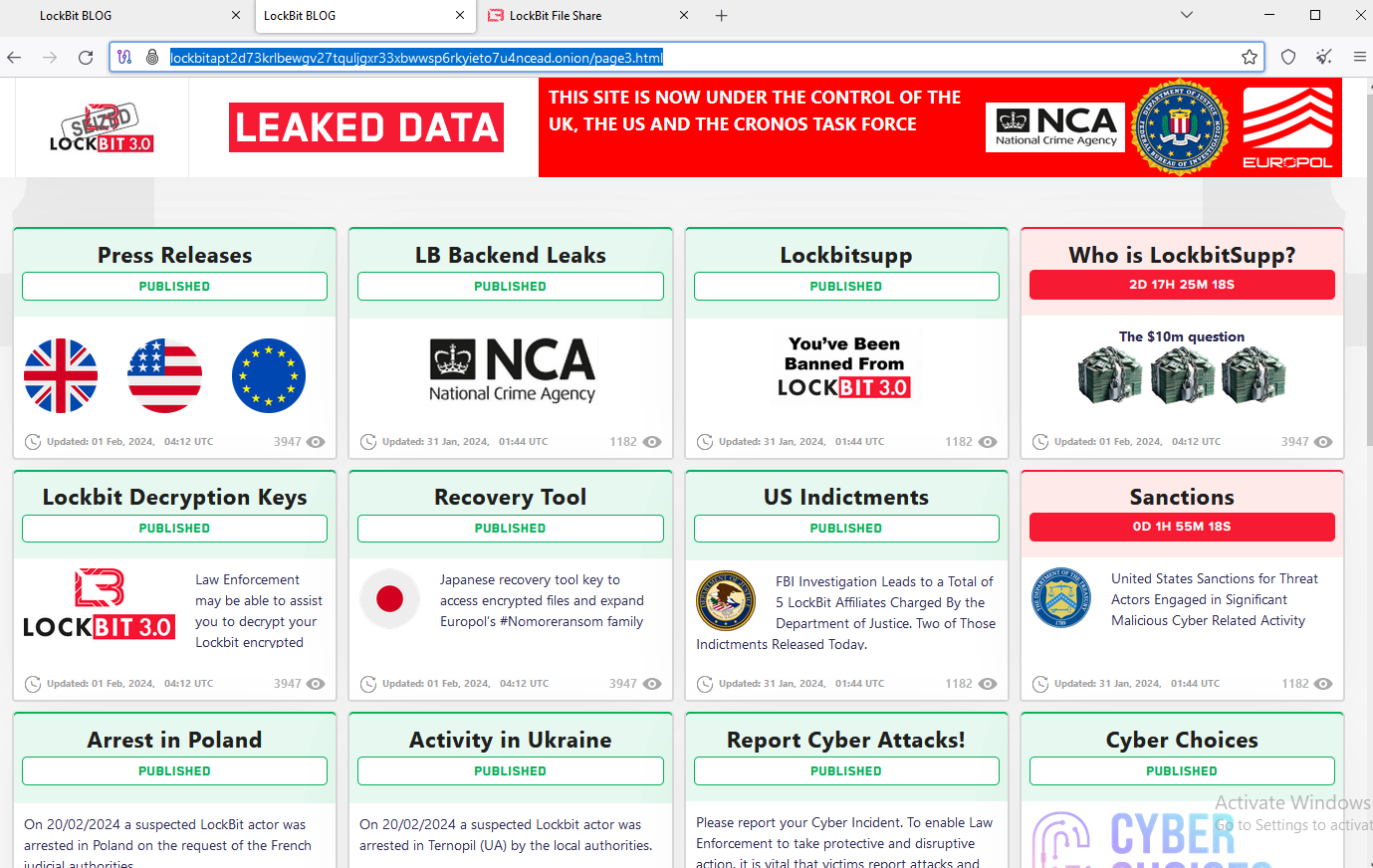
The feds used the existing design on LockBit’s victim shaming website to feature press releases and free decryption tools.
Dubbed “Operation Cronos,” the effort involved the seizure of nearly three-dozen servers; the arrest of two alleged LockBit members; the release of a free LockBit decryption tool; and the freezing of more than 200 cryptocurrency accounts thought to be tied to the gang’s activities. The government says LockBit has claimed more than 2,000 victims worldwide and extorted over $120 million in payments.
In a lengthy, rambling letter published on Feb. 24 and addressed to the FBI, the ransomware group’s leader LockBitSupp announced that their victim shaming websites were once again operational on the dark web, with fresh countdown timers for Fulton County and a half-dozen other recent victims.
“The FBI decided to hack now for one reason only, because they didn’t want to leak information fultoncountyga.gov,” LockBitSupp wrote. “The stolen documents contain a lot of interesting things and Donald Trump’s court cases that could affect the upcoming US election.”
LockBit has already released roughly two dozen files allegedly stolen from Fulton County government systems, although none of them involve Mr. Trump’s criminal trial. But the documents do appear to include court records that are sealed and shielded from public viewing.
George Chidi writes The Atlanta Objective, a Substack publication on crime in Georgia’s capital city. Chidi says the leaked data so far includes a sealed record related to a child abuse case, and a sealed motion in the murder trial of Juwuan Gaston demanding the state turn over confidential informant identities.
Chidi cites reports from a Fulton County employee who said the confidential material includes the identities of jurors serving on the trial of the rapper Jeffery “Young Thug” Williams, who is charged along with five other defendants in a racketeering and gang conspiracy.
“The screenshots suggest that hackers will be able to give any attorney defending a criminal case in the county a starting place to argue that evidence has been tainted or witnesses intimidated, and that the release of confidential information has compromised cases,” Chidi wrote. “Judge Ural Glanville has, I am told by staff, been working feverishly behind the scenes over the last two weeks to manage the unfolding disaster.”
LockBitSupp also denied assertions made by the U.K.’s NCA that LockBit did not delete stolen data as promised when victims agreed to pay a ransom. The accusation is an explosive one because nobody will pay a ransom if they don’t believe the ransomware group will hold up its end of the bargain.
The ransomware group leader also confirmed information first reported here last week, that federal investigators managed to hack LockBit by exploiting a known vulnerability in PHP, a scripting language that is widely used in Web development.
“Due to my personal negligence and irresponsibility I relaxed and did not update PHP in time,” LockBitSupp wrote. “As a result of which access was gained to the two main servers where this version of PHP was installed.”
LockBitSupp’s FBI letter said the group kept copies of its stolen victim data on servers that did not use PHP, and that consequently it was able to retain copies of files stolen from victims. The letter also listed links to multiple new instances of LockBit dark net websites, including the leak page listing Fulton County’s new countdown timer.
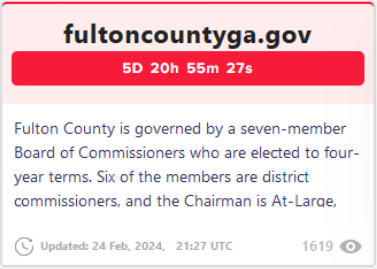
LockBit’s new data leak site promises to release stolen Fulton County data on March 2, 2024, unless paid a ransom demand.
“Even after the FBI hack, the stolen data will be published on the blog, there is no chance of destroying the stolen data without payment,” LockBitSupp wrote. “All FBI actions are aimed at destroying the reputation of my affiliate program, my demoralization, they want me to leave and quit my job, they want to scare me because they can not find and eliminate me, I can not be stopped, you can not even hope, as long as I am alive I will continue to do pentest with postpaid.”
In January 2024, LockBitSupp told XSS forum members he was disappointed the FBI hadn’t offered a reward for his doxing and/or arrest, and that in response he was placing a bounty on his own head — offering $10 million to anyone who could discover his real name.
After the NCA and FBI seized LockBit’s site, the group’s homepage was retrofitted with a blog entry titled, “Who is LockBitSupp? The $10M question.” The teaser made use of LockBit’s own countdown timer, and suggested the real identity of LockBitSupp would soon be revealed.
However, after the countdown timer expired the page was replaced with a taunting message from the feds, but it included no new information about LockBitSupp’s identity.
On Feb. 21, the U.S. Department of State announced rewards totaling up to $15 million for information leading to the arrest and/or conviction of anyone participating in LockBit ransomware attacks. The State Department said $10 million of that is for information on LockBit’s leaders, and up to $5 million is offered for information on affiliates.
In an interview with the malware-focused Twitter/X account Vx-Underground, LockBit staff asserted that authorities had arrested a couple of small-time players in their operation, and that investigators still do not know the real-life identities of the core LockBit members, or that of their leader.
“They assert the FBI / NCA UK / EUROPOL do not know their information,” Vx-Underground wrote. “They state they are willing to double the bounty of $10,000,000. They state they will place a $20,000,000 bounty of their own head if anyone can dox them.”
In the weeks leading up to the FBI/NCA takedown, LockBitSupp became embroiled in a number of high-profile personal and business disputes on the Russian cybercrime forums.
Earlier this year, someone used LockBit ransomware to infect the networks of AN-Security, a venerated 30-year-old security and technology company based in St. Petersburg, Russia. This violated the golden rule for cybercriminals based in Russia and former soviet nations that make up the Commonwealth of Independent States, which is that attacking your own citizens in those countries is the surest way to get arrested and prosecuted by local authorities.
LockBitSupp later claimed the attacker had used a publicly leaked, older version of LockBit to compromise systems at AN-Security, and said the attack was an attempt to smear their reputation by a rival ransomware group known as “Clop.” But the incident no doubt prompted closer inspection of LockBitSupp’s activities by Russian authorities.
Then in early February, the administrator of the Russian-language cybercrime forum XSS said LockBitSupp had threatened to have him killed after the ransomware group leader was banned by the community. LockBitSupp was excommunicated from XSS after he refused to pay an arbitration amount ordered by the forum administrator. That dispute related to a complaint from another forum member who said LockBitSupp recently stiffed him on his promised share of an unusually large ransomware payout.
KrebsOnSecurity sought comment from LockBitSupp at the ToX instant messenger ID listed in his letter to the FBI. LockBitSupp declined to elaborate on the unreleased documents from Fulton County, saying the files will be available for everyone to see in a few days.
LockBitSupp said his team was still negotiating with Fulton County when the FBI seized their servers, which is why the county has been granted a time extension. He also denied threatening to kill the XSS administrator.
“I have not threatened to kill the XSS administrator, he is blatantly lying, this is to cause self-pity and damage my reputation,” LockBitSupp told KrebsOnSecurity. “It is not necessary to kill him to punish him, there are more humane methods and he knows what they are.”
Asked why he was so certain the FBI doesn’t know his real-life identity, LockBitSupp was more precise.
“I’m not sure the FBI doesn’t know who I am,” he said. “I just believe they will never find me.”
It seems unlikely that the FBI’s seizure of LockBit’s infrastructure was somehow an effort to stave off the disclosure of Fulton County’s data, as LockBitSupp maintains. For one thing, Europol said the takedown was the result of a months-long infiltration of the ransomware group.
Also, in reporting on the attack’s disruption to the office of Fulton County District Attorney Fani Willis on Feb. 14, CNN reported that by then the intrusion by LockBit had persisted for nearly two and a half weeks.
Finally, if the NCA and FBI really believed that LockBit never deleted victim data, they had to assume LockBit would still have at least one copy of all their stolen data hidden somewhere safe.
Fulton County is still trying to recover systems and restore services affected by the ransomware attack. “Fulton County continues to make substantial progress in restoring its systems following the recent ransomware incident resulting in service outages,” reads the latest statement from the county on Feb. 22. “Since the start of this incident, our team has been working tirelessly to bring services back up.”
Update, Feb. 29, 3:22 p.m. ET: Just hours after this story ran, LockBit changed its countdown timer for Fulton County saying they had until the morning of Feb. 29 (today) to pay a ransonm demand. When the official deadline neared today, Fulton County’s listing was removed from LockBit’s victim shaming website. Asked about the removal of the listing, LockBit’s leader “LockBitSupp” told KrebsOnSecurity that Fulton County paid a ransom demand. County officials have scheduled a press conference on the ransomware attack at 4:15 p.m. ET today.
A new data leak that appears to have come from one of China’s top private cybersecurity firms provides a rare glimpse into the commercial side of China’s many state-sponsored hacking groups. Experts say the leak illustrates how Chinese government agencies increasingly are contracting out foreign espionage campaigns to the nation’s burgeoning and highly competitive cybersecurity industry.
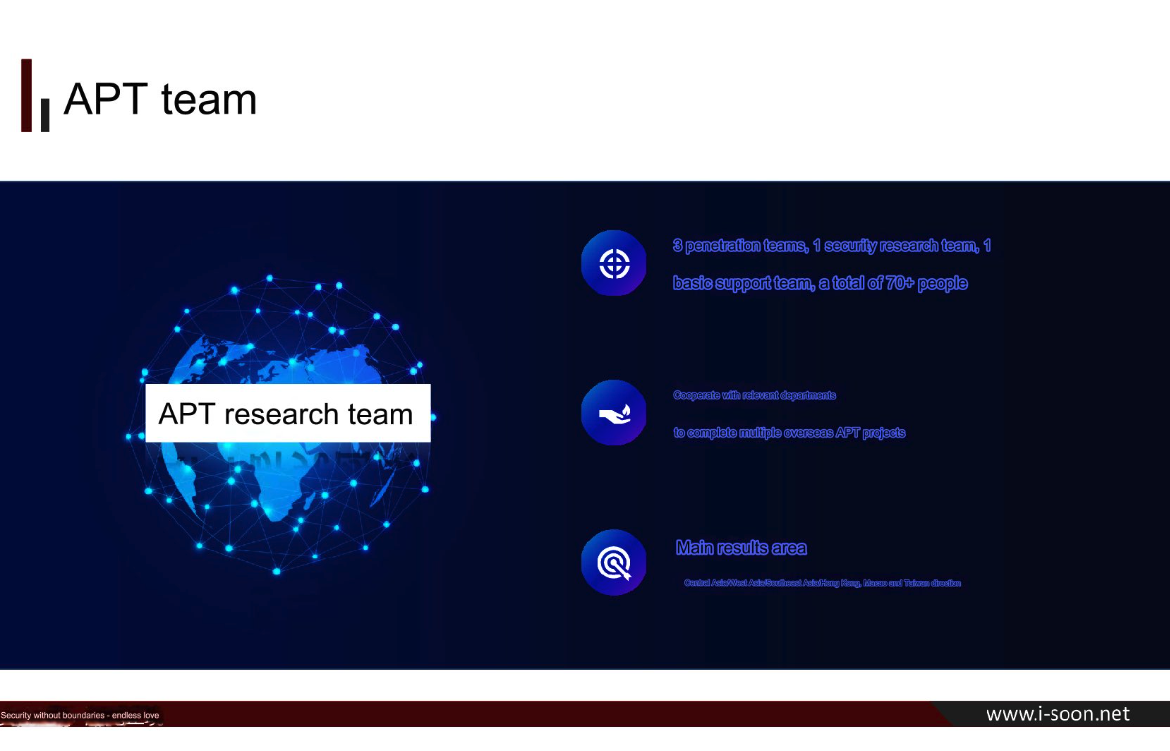
A marketing slide deck promoting i-SOON’s Advanced Persistent Threat (APT) capabilities.
A large cache of more than 500 documents published to GitHub last week indicate the records come from i-SOON, a technology company headquartered in Shanghai that is perhaps best known for providing cybersecurity training courses throughout China. But the leaked documents, which include candid employee chat conversations and images, show a less public side of i-SOON, one that frequently initiates and sustains cyberespionage campaigns commissioned by various Chinese government agencies.
The leaked documents suggest i-SOON employees were responsible for a raft of cyber intrusions over many years, infiltrating government systems in the United Kingdom and countries throughout Asia. Although the cache does not include raw data stolen from cyber espionage targets, it features numerous documents listing the level of access gained and the types of data exposed in each intrusion.
Security experts who reviewed the leaked data say they believe the information is legitimate, and that i-SOON works closely with China’s Ministry of Public Security and the military. In 2021, the Sichuan provincial government named i-SOON as one of “the top 30 information security companies.”
“The leak provides some of the most concrete details seen publicly to date, revealing the maturing nature of China’s cyber espionage ecosystem,” said Dakota Cary, a China-focused consultant at the security firm SentinelOne. “It shows explicitly how government targeting requirements drive a competitive marketplace of independent contractor hackers-for-hire.”
Mei Danowski is a former intelligence analyst and China expert who now writes about her research in a Substack publication called Natto Thoughts. Danowski said i-SOON has achieved the highest secrecy classification that a non-state-owned company can receive, which qualifies the company to conduct classified research and development related to state security.
i-SOON’s “business services” webpage states that the company’s offerings include public security, anti-fraud, blockchain forensics, enterprise security solutions, and training. Danowski said that in 2013, i-SOON established a department for research on developing new APT network penetration methods.
APT stands for Advanced Persistent Threat, a term that generally refers to state-sponsored hacking groups. Indeed, among the documents apparently leaked from i-SOON is a sales pitch slide boldly highlighting the hacking prowess of the company’s “APT research team” (see screenshot above).

i-SOON CEO Wu Haibo, in 2011. Image: nattothoughts.substack.com.
The leaked documents included a lengthy chat conversation between the company’s founders, who repeatedly discuss flagging sales and the need to secure more employees and government contracts. Danowski said the CEO of i-SOON, Wu Haibo (“Shutdown” in the leaked chats) is a well-known first-generation red hacker or “Honker,” and an early member of Green Army — the very first Chinese hacktivist group founded in 1997. Mr. Haibo has not yet responded to a request for comment.
In October 2023, Danowski detailed how i-SOON became embroiled in a software development contract dispute when it was sued by a competing Chinese cybersecurity company called Chengdu 404. In September 2020, the U.S. Department of Justice unsealed indictments against multiple Chengdu 404 employees, charging that the company was a facade that hid more than a decade’s worth of cyber intrusions attributed to a threat actor group known as “APT 41.”
Danowski said the existence of this legal dispute suggests that Chengdu 404 and i-SOON have or at one time had a business relationship, and that one company likely served as a subcontractor to the other.
“From what they chat about we can see this is a very competitive industry, where companies in this space are constantly poaching each others’ employees and tools,” Danowski said. “The infosec industry is always trying to distinguish [the work] of one APT group from another. But that’s getting harder to do.”
It remains unclear if i-SOON’s work has earned it a unique APT designation. But Will Thomas, a cyber threat intelligence researcher at Equinix, found an Internet address in the leaked data that corresponds to a domain flagged in a 2019 Citizen Lab report about one-click mobile phone exploits that were being used to target groups in Tibet. The 2019 report referred to the threat actor behind those attacks as an APT group called Poison Carp.
Several images and chat records in the data leak suggest i-SOON’s clients periodically gave the company a list of targets they wanted to infiltrate, but sometimes employees confused the instructions. One screenshot shows a conversation in which an employee tells his boss they’ve just hacked one of the universities on their latest list, only to be told that the victim in question was not actually listed as a desired target.
The leaked chats show i-SOON continuously tried to recruit new talent by hosting a series of hacking competitions across China. It also performed charity work, and sought to engage employees and sustain morale with various team-building events.
However, the chats include multiple conversations between employees commiserating over long hours and low pay. The overall tone of the discussions indicates employee morale was quite low and that the workplace environment was fairly toxic. In several of the conversations, i-SOON employees openly discuss with their bosses how much money they just lost gambling online with their mobile phones while at work.
Danowski believes the i-SOON data was probably leaked by one of those disgruntled employees.
“This was released the first working day after the Chinese New Year,” Danowski said. “Definitely whoever did this planned it, because you can’t get all this information all at once.”
SentinelOne’s Cary said he came to the same conclusion, noting that the Protonmail account tied to the GitHub profile that published the records was registered a month before the leak, on January 15, 2024.
China’s much vaunted Great Firewall not only lets the government control and limit what citizens can access online, but this distributed spying apparatus allows authorities to block data on Chinese citizens and companies from ever leaving the country.
As a result, China enjoys a remarkable information asymmetry vis-a-vis virtually all other industrialized nations. Which is why this apparent data leak from i-SOON is such a rare find for Western security researchers.
“I was so excited to see this,” Cary said. “Every day I hope for data leaks coming out of China.”
That information asymmetry is at the heart of the Chinese government’s cyberwarfare goals, according to a 2023 analysis by Margin Research performed on behalf of the Defense Advanced Research Projects Agency (DARPA).
“In the area of cyberwarfare, the western governments see cyberspace as a ‘fifth domain’ of warfare,” the Margin study observed. “The Chinese, however, look at cyberspace in the broader context of information space. The ultimate objective is, not ‘control’ of cyberspace, but control of information, a vision that dominates China’s cyber operations.”
The National Cybersecurity Strategy issued by the White House last year singles out China as the biggest cyber threat to U.S. interests. While the United States government does contract certain aspects of its cyber operations to companies in the private sector, it does not follow China’s example in promoting the wholesale theft of state and corporate secrets for the commercial benefit of its own private industries.
Dave Aitel, a co-author of the Margin Research report and former computer scientist at the U.S. National Security Agency, said it’s nice to see that Chinese cybersecurity firms have to deal with all of the same contracting headaches facing U.S. companies seeking work with the federal government.
“This leak just shows there’s layers of contractors all the way down,” Aitel said. “It’s pretty fun to see the Chinese version of it.”
U.S. and U.K. authorities have seized the darknet websites run by LockBit, a prolific and destructive ransomware group that has claimed more than 2,000 victims worldwide and extorted over $120 million in payments. Instead of listing data stolen from ransomware victims who didn’t pay, LockBit’s victim shaming website now offers free recovery tools, as well as news about arrests and criminal charges involving LockBit affiliates.

Investigators used the existing design on LockBit’s victim shaming website to feature press releases and free decryption tools.
Dubbed “Operation Cronos,” the law enforcement action involved the seizure of nearly three-dozen servers; the arrest of two alleged LockBit members; the unsealing of two indictments; the release of a free LockBit decryption tool; and the freezing of more than 200 cryptocurrency accounts thought to be tied to the gang’s activities.
LockBit members have executed attacks against thousands of victims in the United States and around the world, according to the U.S. Department of Justice (DOJ). First surfacing in September 2019, the gang is estimated to have made hundreds of millions of U.S. dollars in ransom demands, and extorted over $120 million in ransom payments.
LockBit operated as a ransomware-as-a-service group, wherein the ransomware gang takes care of everything from the bulletproof hosting and domains to the development and maintenance of the malware. Meanwhile, affiliates are solely responsible for finding new victims, and can reap 60 to 80 percent of any ransom amount ultimately paid to the group.
A statement on Operation Cronos from the European police agency Europol said the months-long infiltration resulted in the compromise of LockBit’s primary platform and other critical infrastructure, including the takedown of 34 servers in the Netherlands, Germany, Finland, France, Switzerland, Australia, the United States and the United Kingdom. Europol said two suspected LockBit actors were arrested in Poland and Ukraine, but no further information has been released about those detained.
The DOJ today unsealed indictments against two Russian men alleged to be active members of LockBit. The government says Russian national Artur Sungatov used LockBit ransomware against victims in manufacturing, logistics, insurance and other companies throughout the United States.
Ivan Gennadievich Kondratyev, a.k.a. “Bassterlord,” allegedly deployed LockBit against targets in the United States, Singapore, Taiwan, and Lebanon. Kondratyev is also charged (PDF) with three criminal counts arising from his alleged use of the Sodinokibi (aka “REvil“) ransomware variant to encrypt data, exfiltrate victim information, and extort a ransom payment from a corporate victim based in Alameda County, California.
With the indictments of Sungatov and Kondratyev, a total of five LockBit affiliates now have been officially charged. In May 2023, U.S. authorities unsealed indictments against two alleged LockBit affiliates, Mikhail “Wazawaka” Matveev and Mikhail Vasiliev.
Vasiliev, 35, of Bradford, Ontario, Canada, is in custody in Canada awaiting extradition to the United States (the complaint against Vasiliev is at this PDF). Matveev remains at large, presumably still in Russia. In January 2022, KrebsOnSecurity published Who is the Network Access Broker ‘Wazawaka,’ which followed clues from Wazawaka’s many pseudonyms and contact details on the Russian-language cybercrime forums back to a 31-year-old Mikhail Matveev from Abaza, RU.
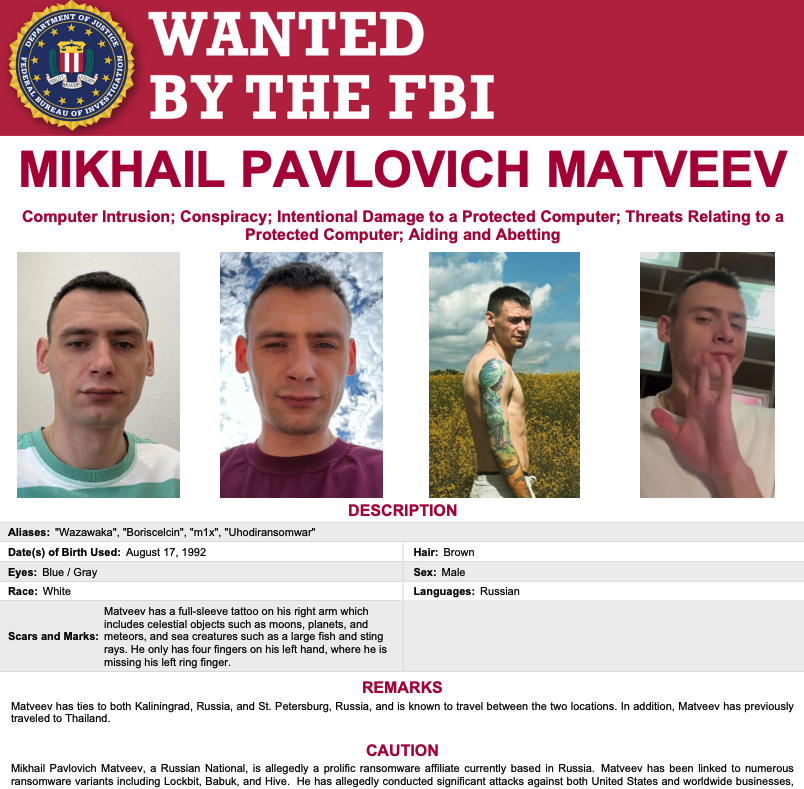
An FBI wanted poster for Matveev.
In June 2023, Russian national Ruslan Magomedovich Astamirov was charged in New Jersey for his participation in the LockBit conspiracy, including the deployment of LockBit against victims in Florida, Japan, France, and Kenya. Astamirov is currently in custody in the United States awaiting trial.
LockBit was known to have recruited affiliates that worked with multiple ransomware groups simultaneously, and it’s unclear what impact this takedown may have on competing ransomware affiliate operations. The security firm ProDaft said on Twitter/X that the infiltration of LockBit by investigators provided “in-depth visibility into each affiliate’s structures, including ties with other notorious groups such as FIN7, Wizard Spider, and EvilCorp.”
In a lengthy thread about the LockBit takedown on the Russian-language cybercrime forum XSS, one of the gang’s leaders said the FBI and the U.K.’s National Crime Agency (NCA) had infiltrated its servers using a known vulnerability in PHP, a scripting language that is widely used in Web development.
Several denizens of XSS wondered aloud why the PHP flaw was not flagged by LockBit’s vaunted “Bug Bounty” program, which promised a financial reward to affiliates who could find and quietly report any security vulnerabilities threatening to undermine LockBit’s online infrastructure.
This prompted several XSS members to start posting memes taunting the group about the security failure.
“Does it mean that the FBI provided a pentesting service to the affiliate program?,” one denizen quipped. “Or did they decide to take part in the bug bounty program? :):)”
Federal investigators also appear to be trolling LockBit members with their seizure notices. LockBit’s data leak site previously featured a countdown timer for each victim organization listed, indicating the time remaining for the victim to pay a ransom demand before their stolen files would be published online. Now, the top entry on the shaming site is a countdown timer until the public doxing of “LockBitSupp,” the unofficial spokesperson or figurehead for the LockBit gang.
“Who is LockbitSupp?” the teaser reads. “The $10m question.”
In January 2024, LockBitSupp told XSS forum members he was disappointed the FBI hadn’t offered a reward for his doxing and/or arrest, and that in response he was placing a bounty on his own head — offering $10 million to anyone who could discover his real name.
“My god, who needs me?,” LockBitSupp wrote on Jan. 22, 2024. “There is not even a reward out for me on the FBI website. By the way, I want to use this chance to increase the reward amount for a person who can tell me my full name from USD 1 million to USD 10 million. The person who will find out my name, tell it to me and explain how they were able to find it out will get USD 10 million. Please take note that when looking for criminals, the FBI uses unclear wording offering a reward of UP TO USD 10 million; this means that the FBI can pay you USD 100, because technically, it’s an amount UP TO 10 million. On the other hand, I am willing to pay USD 10 million, no more and no less.”
Mark Stockley, cybersecurity evangelist at the security firm Malwarebytes, said the NCA is obviously trolling the LockBit group and LockBitSupp.
“I don’t think this is an accident—this is how ransomware groups talk to each other,” Stockley said. “This is law enforcement taking the time to enjoy its moment, and humiliate LockBit in its own vernacular, presumably so it loses face.”
In a press conference today, the FBI said Operation Cronos included investigative assistance from the Gendarmerie-C3N in France; the State Criminal Police Office L-K-A and Federal Criminal Police Office in Germany; Fedpol and Zurich Cantonal Police in Switzerland; the National Police Agency in Japan; the Australian Federal Police; the Swedish Police Authority; the National Bureau of Investigation in Finland; the Royal Canadian Mounted Police; and the National Police in the Netherlands.
The Justice Department said victims targeted by LockBit should contact the FBI at https://lockbitvictims.ic3.gov/ to determine whether affected systems can be successfully decrypted. In addition, the Japanese Police, supported by Europol, have released a recovery tool designed to recover files encrypted by the LockBit 3.0 Black Ransomware.